UK housing crisis causes nancial, mental strain for students

News
New LSE building at 35L, page 3
More UCU strikes anticipated, page 4
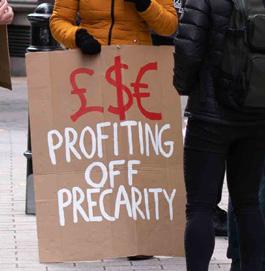
Features
In person exams cause falling grades, page 7
Black students’ AU experiences, page 8
Opinion
Cost of living: students need support! page 9
Chenoa Colaco
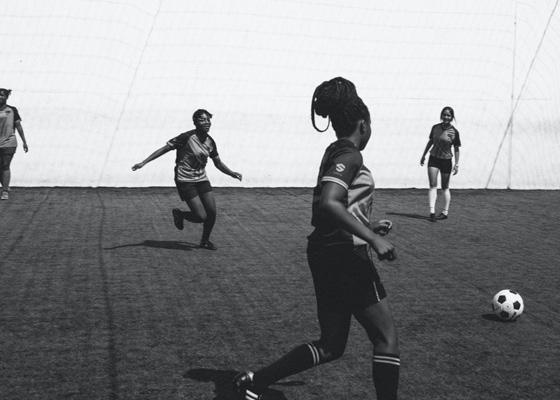 Sta Writer
Illustrated by Charlie To
Sta Writer
Illustrated by Charlie To
University students throughout the UK
recruitment. On 22 August 2022, e O ce of Gas and Electricity Markets, Britain’s energy regulator, raised its main cap on consumer energy bills to an average £3,549 ($4,197) from £1,971 a year.

is announcement received widespread concern as Senior Economist Johnny Marshall predicted thousands having their energy cut o entirely
and millions struggling to pay their high costs. University students, especially those living outside of halls will be extremely vulnerable to these new implementations. Alongside this, universities in Manchester, Glasgow, and Bristol have pushed many rst years out of halls due to over-recruitment amid in ation levels in the UK reaching 10% and a looming


recession. While recent events have brought the student housing issue to attention, the Save the Students Survey 2018 shows that students have been struggling with rising costs for years. Up to 44% of students struggle with rent and bills, with many admitting the strain it puts on their mental health.

Continued on page 3
We should reject the brand of monarchy page 12
& WHAT’S ON BEAVER SOUND? See page 13!
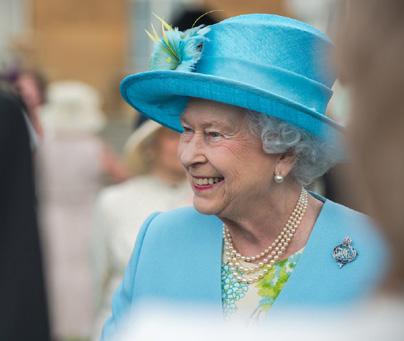
Newspaper of the LSE Students’ Union: Making Sense of LSE Since 1949 Issue 921 | MT Week 3
INSIDE TODAY
& flip for... HANDS OFF LSE HANDS OFF LSE
Meet the team
photos by Jack Love
Executive Editor
Aarti Malhotra executive.beaver@lsesu.org
Managing Editor
Vani Kant managing.beaver@lsesu.org
Flipside Editor
Ambre Pluta editor. ipside@lsesu.org
Beaver Editor Jack Beeching editor.beaver@lsesu.org
Multimedia Editor Vaneeza Jawad multimedia.beaver@lsesu.org
News Editors
Aysha Sarah
Klara Woxstrom
Features Editors
Bora Bayram
Alan Nemirovski

Opinion Editors
Sonya Belkin
Alina Chen
Part B Editor
Anouk Pardon
Social Editor
Matt Sudlow
Review Editor

Ben Helme
Podcast Editors
Dillon Loh

Lily Whittle
Head of Illustration
Charlie To
Head of Videography
Jessy Yang


Any opinions expressed herein are those of their respective authors and not necessarily those of the LSE Students’ Union or Beaver Editorial Sta
e Beaver is issued under a Creative Commons license.

necessary.
Eat, Sleep, Beaver, Repeat
Aarti Malhotra Executive Editor



Here’s the deal: I could very easily go o on a tangent about all the the hiccups we’ve faced leading up to this very moment of you holding e Beaver’s issue #921 in your hands, but I’d rather save those stories for my nsta (and our Editors’ Slack channel).

Instead, I want to use this space to - as I o en say - toot our own horn. Flipping through the old volumes of e Beaver dating back decades while preparing for the Welcome Fair was an unnerving reality check: the bar’s been set high. We have such a long legacy to live up to and sustain; confronting that fact has been the most daunting thing coming into third year.
But right now, looking around our team work so intently on this issue at 10am on a Saturday morning, I am so proud and beyond excited for what
Pretty good pasta
Jack Beeching Beaver Editor
Hello.It’s here: e Beaver #921. I’m proud of this paper and I think that our work speaks for itself.
at’s why I’m going to use this space to share something more useful: my favourite pasta recipe. Freshers, this is for you. Hope you’re doing okay.
Pasta alla Norma
Ingredients (serves one): 125g pasta. Half an aubergine. A tin of tomatoes. Half an onion. Olive oil. A few cloves of garlic. Ricotta. Fresh basil.
1. Dice the aubergine. You’re meant to salt and drain it, but
lies ahead. Our writers, editors, illustrators, photographers, podcasters, and videographers have worked incredibly hard and have so much to o er. is issue proves that.
For some no-nonsense news, I recommend Chenoa’s front cover story on the housing crisis. en, ip over to features for Vanessa’s piece on the experience of Ukrainian students at LSE. I also very much enjoyed Vaneeza’s “Horror-scopes”, although I do think it was quite (very) forgiving of leos. Oh, and don’t miss Charlie’s gorgeous illustrations woven throughout this 24-page spread.








For those of you who cannot be bothered to use your eyes a er history readings or need a little something to keep you occupied on your commute to campus, head over to Spotify to check out the rst episode of our new series ‘ e Beaver Breakdown’ for a deep-dive into some special picks from this issue.


you won’t have time.
2. Finely chop the onion and garlic. Fry the onion in a large pan until golden. Add the garlic. When the aroma rises, pour in the tomatoes. Turn the heat right down and season with whatever you have (salt, pepper, oregano, chilli akes are solid options). Leave to simmer for 15-ish minutes.
3. Start cooking the pasta. Fry the aubergine on a very high heat (you want it crispy).
4. Once the aubergine is lightly browned, mix it into the sauce. en add the pasta, preferably al dente. Mix well with a couple spoonfuls of ricotta. Serve with basil if you want to impress.
Good luck.
For more information and rates, contact us at managing.beaver@lsesu.org
MT Week 3 www.thebeaverlse.co.uk 2
ADVERTISE WITH US TODAY!
Ili
Print,
Room 2.02 Saw Swee Hock Student Centre LSE Students’ Union London WC2A 2AE 020 7955 6705
Attribution
Printed at
e
Cambridge
"Hey!" by Charlie To
Front page by Vaneeza Jawad
UK housing crisis causes nancial, mental strain for students
 Chenoa Colaco Staff Writer
Chenoa Colaco Staff Writer
The National Union of Students in Scotland have also released alarming statistics stating that 12% of students are in a state of homelessness and a third are considering dropping out of their course due to nancial di culties.
Several students at LSE have commented on their di culty nding housing as well as keeping up with the costs.
A second-year International History student commented: “We started looking as early as November but we couldn’t nd anything good until April. We had to lower our standards on things like being close to campus and having one bathroom for each person. It was really stressful especially for me because I don’t have any family in the UK, and I would have nowhere to stay if I couldn’t nd a house for the next year.”
“We also had bad experiences with our landlord. None of us knew how to handle the forms and things like that and our landlord did not know how to support us at all. At one point he just suddenly told us to pay a £2500 deposit and we all had to scramble to nd the money. It was a really tiring situation and the bills are just adding more and more problems.”
Students at LSE nd the halls a “worse alternative to private housing. A second-year Geography student in Rosebery Hall commented that their rent increase from £238 to £248 pounds a week does not translate into quality of housing. He states, “ e value of money is basically non-existent. We get rooms smaller than prison cells and our kitchens don’t even have ovens. It isn’t fair that because we live in London we can be charged so much and we have no other choice but to stand and take it.”
A third-year Politics student who commutes to London has also commented on the drawbacks of their living situation, explaining, “I struggled commuting to university and it has de nitely impacted my overall university experience. ere is the logistical and nancial matter of dealing with transport costs where sometimes I have to go on two trains and a bus to get to classes on time.”
e student expresses that the long commute to campus has created an isolating feeling. “It has…really a ected my social life. Most of my friends live pretty close to campus or in student accommodation and I feel like I’m an outsider. A lot of students thrive on the idea of a social life at university including myself.
While these problems persist throughout the UK, students in
London are said to be hit the hardest due to the high cost of living in the city. Universities are encouraged to provide support for students who are living amidst the housing crisis.
LSE o ers several forms of support for nancial di culties including maintenance loans and funds. An LSE spokesperson said, “All students can apply to LSE’s Student Support Fund, designed to support all registered students who are in unexpected nancial di culty and can demonstrate that they are facing challenges.” In response
to the current housing crisis, “LSE has increased this fund in the 2022/2023 academic year to proactively help our student community.
“ e School also provides generous nancial support, in the form of bursaries and scholarships, to UK and overseas students to help with living and accommodation costs. ese include an LSE Accommodation Bursary to help towards the cost of halls of residence and an LSE Bursary and Discretionary Bursaries to help students with exceptional nancial needs.”
David Chipper eld Architects win bid to rebuild 35 Lincoln's Inn
Jessica Pretorius Staff Writer
This August, David Chipper eld Architects won a Royal Institute of British Architects competition to design and re-build 35 Lincoln’s Inn Fields (35L), formerly the home of the Royal College of Surgeons.
e competition was announced in February and had more than 100 applicants, which were judged by LSE’s Director of Estates Julian Robinson, Minouche Sha k, LSE
Cities Professor Ricky Burdett, the former LSESU General Secretary Josie Stephens and Firoz Lalji, who is sponsoring the project.
David Chipper eld is a renowned British architect whose practice has won many international competitions.
e LSE project will cost £120 million and will re-use much of the existing building in an attempt to be more environmentally-friendly. e project will keep 60% of the existing 35L, such as the foundations of the building and the facades. Much
of the project will also be o set, to keep emissions as low as possible.
e new building will house LSE’s new Firoz Lalji Global Hub, a space dedicated to LSE events and extra-curricular learning both on campus and online. e space will include teaching spaces, conference rooms, data science labs, a lm studio, a 350-seat theatre, breakout rooms, and a café.
Firoz Lalji is a Ugandan-born former LSE student, who has committed $35m to the project. is commitment, given
via the Lalji Family Foundation, brings Lalji’s contributions to LSE to over £45 million which is the largest alumni contribution in LSE’s history. In 2012, the Lalji Family Foundation helped to found LSE’s Program for African Leadership, and he is also the namesake of LSE’s Firoz Lalji Institute for Africa.
David Chipper eld said to Architect’s Journal that the project “demonstrates how the reuse of existing buildings can be seen not as an obligation but as a commitment to a more resourceful and responsible approach to our future, based on intelligent use
For students struggling, “the support map on the LSE Student Hub has guidance about where to go if students need support with anything relating to their LSE experience, including housing.”
of existing material and cultural capital.”
Over the past 15 years, LSE has invested more than £500 million into re-doing its campus and is now focusing on transforming older buildings to help the University reach net zero carbon by 2030.
News Editors Klara Woxström Aysha Sarah news.beaver@lsesu.org
NEWS 3
YouGov poll: UK universities are 'bad value for money'
Mastura Omar Contributor
Illustrated by Charlie To
On 31 August, a survey published by YouGov reported that a majority of English people believe current UK university fees of £9,250 are "bad value for money.” With the government’s new changes on the repayment of student loans, the survey revealed that whilst 44% of non-graduates support the new scheme, 50% of graduates opposed it.
Gabriel Leroy, the Secretary of LSESU Labour Society, expressed: “Especially with the latest changes to the tuition fees loans system…Current university fees are bad value for money, and are o -putting to many prospective working-class students across the country.”
Out of 1,500 adults, only 19% felt that the current UK university fee is a good value for university education. Similarly, graduate respondents expressed equivalent views with a mere 18% believing the cur-
rent university fees correlate with the quality of education, as opposed to 69% of graduates believing the opposite.
Tasha Bellinger, Secretary of LSE Conservative Society expressed: “Whether or not tuition fees are good value for money depends on individual universities and how they allocate their spendings.”

Despite the majority of respondents believing current university fees are bad value, when asked whether a university education impacts gradu-
ates’ future earning potential, 44% of respondents who did not hold a university degree believed graduates under the government’s new policy will bene t in the long run. In contrast, graduates themselves believed the opposite to be true.
“ e current system of maintenance and tuition loans does place too much of a burden on my future earnings, and the maintenance grants abolished under the Conservative austerity certainly pushed many working-class students away from Uni”, Leroy said.
In regards to how university tuition fees should be funded, the survey found that 42% supported the current scheme of fees and student loans, whilst 26% believed education should be paid from the general taxation, and only 11% were for a tax funded by graduates.
“ e student should be responsible for funding their own tuition fees. Our current system is essentially a tax on students that have attended university and to extend that to the rest of the population, who have not utilised
this service would be extremely unfair,” Bellinger commented.
In contrast, Leroy suggested that the system “should be designed so that it encourages the most social mobility possible… Surely it is fair that those who had the opportunity to go to uni and gain these higher salaries should not have this paid for by the state.
‘‘ ere has to be a graduate tax, paid by all students no matter their background. is ensures that the upper-class students who currently just pay their tuition themselves contribute their fair share, and it means that it will not disadvantage those who did not have the opportunity to go to university by tabbing tuition fees on the taxpayer.”
When asked what party the respondents trust to handle the issue of education, 26% supported Labour, 19% supported the Conservatives, and only 6% the Liberal Democrats. Signi cantly, 44% expressed they did not know, making up the largest proportion.
Strike action likely to continue this year
Klara Woxström
News Editor
Photographed by Josiah Wang
e ballot concerns the UCU’s demands for a 12% pay increase in accordance with the Retail Price Index (RPI) with an additional 2%.
This year, universities are expected to face continued strike action concerning pay and pension from sta
On May 9 2022 a 3% pay o er was made by the University and Colleges Employers Association. However, the o er was rejected and university sta including cleaners, administrators, librarians, caterers, and security workers are expected to protest in the coming months.
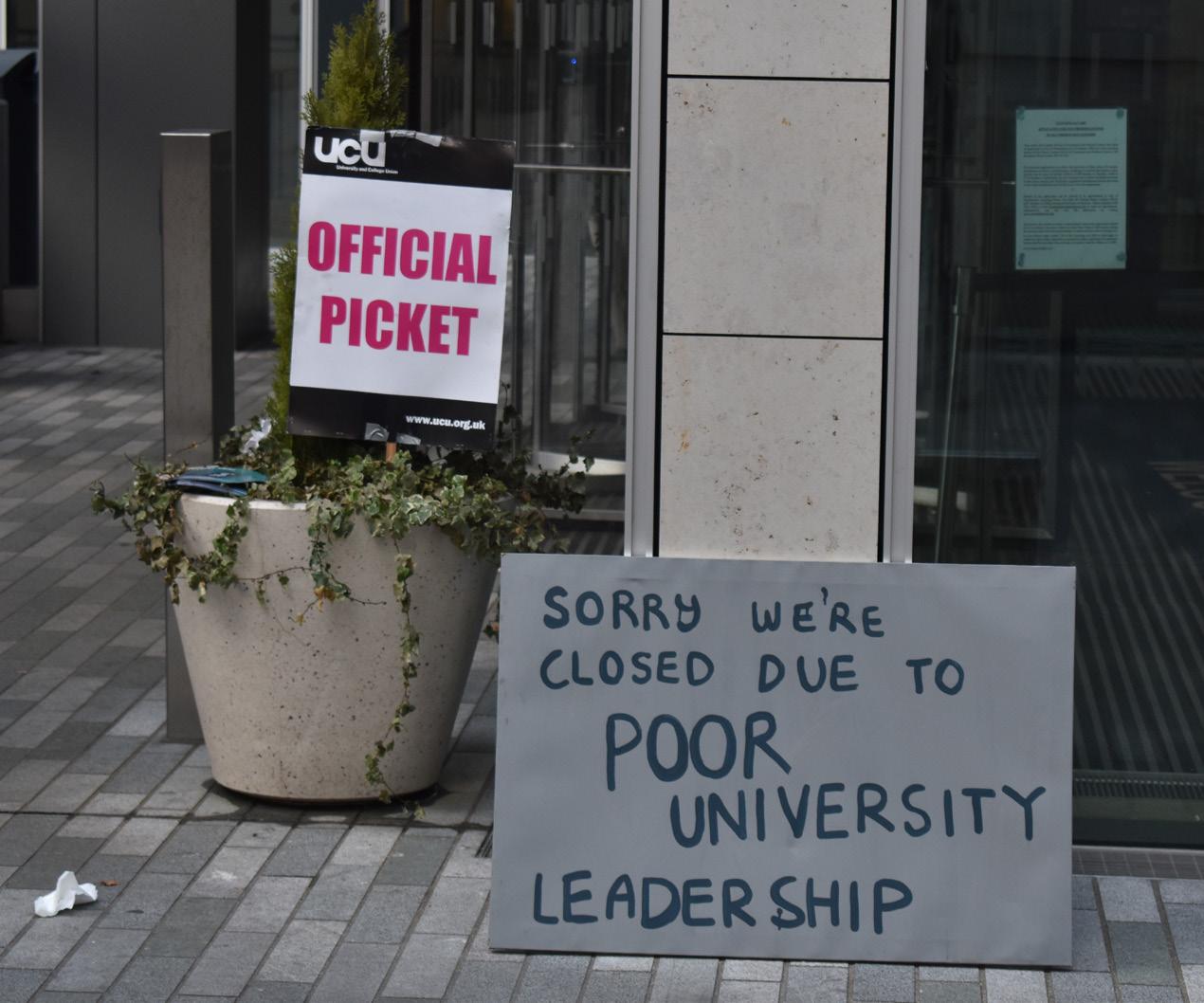
is comes a er a strike ballot opening on September 6 for University College Union (UCU) members at 151 campuses across the United Kingdom, e ballot will run until the 21st of October.
e ballot also includes demands on eliminating practices such as zero-hour work contracts and addresses the ‘dangerously high workloads’ imposed on sta
e ballots are nationally aggregated: if over half of the universities are in favour of strike action when the ballots close in early October, every institution is expected to strike this autumn. e UCU has stated that this will cause unprecedented disruption.
e UCU also highlights that even though the higher education sector generated a record income in the 2020/2021 academic year (£4.6 billion), the 3% pay o er only amounts to £600 million.
However, rising in ation has le many institutions feelingnancially strained. Mike Short, the head of education for the trade and public service union, UNISON, stated, “ e shock of the cost-of-living crisis has pushed many to breaking point.”
In the 2021/2022 academic year, LSE strike action took place in December, February, and March. On how the expected strikes will a ect students, the LSESU General Secretary Tilly Mason sympathised, “I think especially for postgraduate and international students, who pay such high fees, it was a bit frustrating to have classes cancelled [last year].”
Yet she encourages students to support the strikes: “Tuition fees are set by the government and universities, and it is in the best interest of both students and academic sta to ght against marketisation and make sure any fees will always
go to good quality teaching and better working environments for everyone!”
“In my personal capacity, I support the strikes and was very involved in mobilising students last year.” On how the SU will respond to potential strikes by sta , Mason said: “If UCU members vote to strike this
year… we intend to ballot the student body to gauge general student support and base the SU’s response o of that.”
News
4
Pound drops, making fees cheaper for international students
Aysha Sarah News Editor
On 26 September the British pound fell to its lowest level against the US dollar since the decimalisation of the British currency in 1971.
is fall has helped some students, whilst harming others. International students who receive funds in US dollars or in currencies that have recently strengthened against the pound will enjoy ‘happy days’ as their money will go further, according to analysis done by e Washington Post

e discounted pound makes tuition fees, accommodation and other essentials relatively cheaper for international students, when compared with previous years.
e Beaver asked some of LSE’s US students how they had been a ected; Jack Love, a third-year
International Relations student commented: ‘‘I’m mostly disappointed that I sent myself money from the US a few weeks before the pound dropped signi cantly and could have retained more money in the transfer. However, now I’m being somewhat cautious about sending money again because I suspect the pound will fall more.’’
Love added, ‘‘I pay for my accommodation using dollars and the exchange rate changes are certainly factoring into my decision regarding when to pay rent.’’
An analysis by Bloomberg published on 26 September has shown that nancial markets believe there is a 60% probability that the sterling will reach dollar parity by the end of 2022.
A third-year accounting student commented: ‘‘While I am pleased that international students, par-
Upcoming Events: Black History
Aysha Sarah Klara Woxtröm News Editors
Academic Rep Welcome Social
Where: Saw Swee Hock Centre, 6th oor, 6-9pm
O ers free pizza and drinks and welcomes students to meet their Academic Representatives and learn more about the Students’ Union.
Postgraduate Welcome (back) Party, 5:30-7:30pm
Where: Mezzanine, Basement, LSE Saw Swee Hock
An opportunity to meet other postgraduates and discover the Students’ Union!
Month, SU elections, and more
ticularly those from the US, have greater disposable incomes as a result of recent currency exchange shi s, I am concerned for home students. is winter, many student households across the UK, particularly those from more deprived socio-economic backgrounds, will have to exert far more e ort just to survive than the current, undemocratically elected government will do to assist them.’’
Black History Month: A Lesson in Black History Part 2 20
Black History Month: A Lesson in Black History Part 1
Where: Digital event
e rst of a three-part mini-series presented by acclaimed authors and thought-leaders Mireille Harper and Seun Matiluko. It will discuss black leaders throughout history, their legacy and the importance of preserving them.
Students’ Union Election Nominations Close, 5pm
Candidate Question Time: An opportunity to ask LSESU society nominees any questions you might have!
Black History Month: A Lesson in Black History Part 3
Students’ Union Election Results
5 News
13 Oct 13 Oct 14 Oct 14 Oct 18-20 Oct 24 Oct
Union Election Polls Open 24-26 Oct 27 Oct
Students’
Oct
FEATURES
How LSE’s Ukrainian students are coping, seven months into the war
 Vanessa Huang Staff Writer
Vanessa Huang Staff Writer
On the eve of the Feburary 24, Danylo Nikiforov was unable to sleep. As President of the LSESU Ukrainian Society, he was all too aware of Russia’s mounting threats towards Ukraine. In the preceding weeks, the society had coordinated gatherings outside the Ukrainian embassy, the Russian embassy and 10 Downing Street, all to stand in solidarity with Ukraine and denounce Russian aggression. But that night, the unfathomable occurred.
“I was monitoring the news and livestreams and suddenly a lot of newsflashes started popping up and I could see explosions on the livestreams,” he says. “As soon as it was confirmed that Russia [had] invaded Ukraine, I woke up my parents, who live very close to [the] Bucha region, and told them that the war [had] begun. When I called them again, I could hear explosions and helicopters flying in the background. That was the night when Russian airborne troops attacked Hostomel Airport not too far away from my house.”
For Aleksandra Slyusar, head of the Ukrainian Society’s marketing, the news also came as a shock. She woke up to frantic calls and messages from friends and family and instantly called her mother. “[My mum] told me the war had started and I felt terrified,” she says. “I was in disbelief that this [was] really happening.”
Once the news broke, the Ukrainian Society immediately mobilised its members and pivoted its activities towards vigils, protests, and fundraisers. Within days, they announced the formation of the Ukrainian Students Union (USU), a joint group of Ukrainian students across multiple UK universities. Then in March, alongside Ukrainian societies from UCL, University of the Arts London, and City, University of London, LSESU Ukrainian Society held a fundraising
gala, raising over £10,000 towards military aid for Ukraine and receiving commendation from Prime Minister Boris Johnson for their efforts.
The society continued to take a leading role in the USU and expanded its initiatives over the following months. Through its relationship with the Ukrainian embassy, the USU coordinated a live broadcast in June from Ukrainian President Volodymyr Zelenskyy to thousands of students across multiple institutions in the UK. This included a direct broadcast to LSE’s Sheikh Zayed Theatre, with Ukrainian ambassador to the UK Vadym Prystaiko present. During his address, President Zelenskyy reaffirmed Ukraine’s commitment to keep fighting, and hailed Ukrainian students in the UK as “ambassadors” for the country that would play a vital role in its reconstruction.
The feats the society has achieved over the past few months are astonishing on their own, but to have done so in the midst of being bombarded with photos and videos of your own country’s destruction and worrying about the safety of your own friends and family is unimaginable. Danylo lists the four things
that have impacted him the most since the start of the war: the blockade of Kyiv while his family was in the city, the Bucha massacre, the destruction of Mariupol, and the deaths of people he personally knew. When he describes the past several months as “a constant state of anxiety and [worry],” this seems like an understatement. But Aleksandra points out that working together to coordinate these events was in itself instrumental in supporting Ukrainian students, as it provided them with “a sense of community and unity,” particularly for students that were away from their homes and families.
Outside of Ukrainian Society, Danylo and Aleksandra express appreciation for the support they and other Ukrainian students have received from LSE. “LSE issued a response that I believe is one of the best coordinated in the UK and addressed every concern that members of our society and Ukrainians at LSE had,” Danylo says.
Their feelings about the global response, however, are less favourable. “After over half a year of killing and destroying my country, I have a lot of resentment towards the
Russian regime and anger towards the world for not doing enough to stop this genocide,” Aleksandra says. She describes her feelings now as “more anger than fear,” taking aim specifically at European nations whose actions, she believes, have fallen short: “Europe’s [de pendence] on Russian oil has inhibited their ability to take a stance which should have reflected the values of freedom and democracy [that] the West praises.” Danylo, on the other hand, is more measured with his criticism. He laments the loss of life that could have been prevented had there been greater support in the first few days of the war, but says that “the global community [has] helped Ukraine a lot.”
The Russian invasion of Ukraine dominated global news as it began to unfold, but as time goes on, attention is beginning to wane. As of 15 September , the term ‘Ukraine’ stands at a tenth of its peak popularity, according to Google Trends. Razom for Ukraine, a charity based in New York, similarly received an outpouring of support at the start of the war that has since dropped. As the news shifts its attention to the next social media phenomenon,
Ukraine risks being left behind by the global community.
Still, Danylo and Aleksandra are approaching the future with a sense of cautious optimism. The challenges Ukraine faces remain monumental. The Ukrainian government, European Com mission and World Bank jointly estimate the cost of reconstruction at 349 billion euros, which would plunge Ukraine into “severe economic crisis,” as Aleksandra puts it. But, if anything, the past seven months have been a lesson in never underestimating Ukraine’s resilience. From the outset, Ukraine facing up to a perceived great power like Russia seemed impossible, and Danylo, like many, feared Ukraine would be “losing the war in 3 days.” Not only has Ukraine managed to hold its own, but news of its success in its recently launched counteroffensive has begun to spread. Despite Russia’s partial mobilisation of its military, Ukraine has boldly shifted from defending to reclaiming its territory in the south and northeast, fuelling hope and excitement across the world. When I ask if there’s anything else they would like to add before closing, Aleksandra simply responds: “ Слава Україні ! (Slava Ukraini!)”
Features Editors Bora Bayram Alan Nemirovski features.beaver@lsesu.org
6
Grades plummet as in-person exams take their toll
Bora Bayram Features Editor
Many departments saw a signi cant decline in their mean course marks last year as in-person exams were reintroduced. e results reversed the grade in ation seen during Covid when all departments had online assessments. According to analysis by e Beaver, departments that primarily had in-person exams, such as Accounting, Economics, and Finance, all saw a decline in grades. Results generally declined below pre-pandemic averages for these departments. On the other hand, departments that had online exams saw little change compared to before the pandemic.
Among departments that had in-person exams, Accounting saw the most dramatic decline; its average mark from 2017 to 2019 saw a mark average of 69.9 compared to 58.8 in the 2021/22 academic year, a massive decline of 11.1 marks. In the same period, Finance sawa decline of 5 marks, while mean marks for Statistics and Economics declined by 3.95 and 1.55 marks respectively.
Overall, the departments that had in-person exams saw their average marks decline by 3.4 points compared to the two years before the pandemic.
In contrast, departments that primarily had online exams this past summer saw little change in their exam results when compared to pre-pandemic averages. e only departments
that saw a change of more than 1 mark were Philosophy, which increased by 1.25 marks, and Anthropology, which declined by 1.3 marks. Overall, departments that held online exams saw their average marks increase by 0.3 when compared to results pre-pandemic, essentially staying the same.
e decline in grades is even more dramatic when last year is compared to 2019/20 and 2020/21, when the pandemic was in full swing. Every single department saw a decline of peak grades seen during Covid, regardless of the assessment method. e largest disparity was seen once again in Accounting, which saw a 19.6 mark decline between the Covid peak and last year, followed by Finance with 13.2 and Mathematics with 10.7 mark decline. Departments that stuck with online assessments also saw a decline in the same period, though less dramatic - Management, with a 3.7 point decline from its Covid peak, was the largest disparity in the group.
e summer exam period saw the rst in-person exams at LSE since the pandemic started. Many departments were eager to return to traditional assessment methods, while others opted for various combinations of online and in-person exams. Although departments generally made a binary choice between online and in-person exams for most of their courses, many introductory rst-year
courses were assessed in person, even if the department kept second and third-year courses online. For example, all but one Economic History course was assessed online. EH101, the department’s most popular course, had an in-person exam, re ecting a possible future shi towards in-person assessments in departments that were more willing to retain online exams last summer.
For many students, the shi back to in-person exams has been academically and mentally challenging. Looking at last
us with online exams.” While the confessions touched on a range of topics, the impact of exams on mental health was a common theme across many of them.
Maarya Rabbani, Education
O cer at LSESU, thinks that although these results are “shocking”, they are not unexpected: “ e onset of the pandemic has exacerbated mental health and well-being issues like anxiety and depression, and to expect students to be able to perform well on a test taken in person, without the practice and prepa-
benchmarks set by our Russell Group neighbours.”
Rabbani says that the traditional approach towards assessments needs to be challenged and that there needs to be more diversity in assessment methods: “If you take a giant leap back and problematize the concept of exams within the UK context, in general, it is still not an adequate metric to test students’ understanding of course material … We kind of see these one-time, one-end of module exams as a litmus test for excellence and I think that so much of that understanding is so old fashioned.”
“By having compassion for students, you’re not lacking rigour,” she says.
year’s cohort, only third-year students had sat pre-pandemic A-level and IB exams, while almost all second-years and many rst-years had little proximate experience in sitting formal exams as a result of their cancellation due to Covid. Many students reported having a hard time with their mental health during exam season.
is toll on mental health was exempli ed by ‘LSE Stressed’, an Instagram page which published over 200 anonymous student confessions.One student wrote: “Exams are causing me so much stress and anxiety … My dept have given basically no support or adjustments to help
ration in the same way, is not a fair ask and will be a huge detriment to their academic trajectory.”
In light of these results, Rabbani thinks that now is the time to scrutinise exam policies for the sake of students and their mental health: “LSE has a responsibility to act on the results we have received and come up with an approach that is more comprehensive in not only combatting how students are coping with [exams] but also something more sustainable to address it in a more holistic way … Part of my role is to challenge LSE to think progressively without the blinders and
She thinks that LSE should start by listening and communicating its decision-marking clearly, “hopefully open[ing] new avenues for student feedback where we can all transparently monitor how LSE has been able to take what students said and do something about it.”
Even though LSE has reversed the trend of grade in ation, which it considered detrimental to its reputation, there are questions that remain about mental health, student feedback, and how receptive management is towards change. Time will tell if students’ views can genuinely make a di erence towards how assessments are conducted.
Features
7
“ e largest disparity was seen once again in Accounting, which saw a 19.6 mark decline between the Covid peak and last year...”
One of our primary objectives this year as the Athletic Union executive is to make the AU a more inclusive and representative organisation, re ecting the diversity of LSE’s student body. We wanted to form a deeper understanding of the experiences of some of the people. e central purpose of this article is not to champion our own initiatives, nor is it to critique past executive committees. Black History Month is not only about celebrating Black history, but it is also about acknowledging the varied Black experiences in the societies in which we live. rough a series of interviews with Black members of the AU, we have started the process of interrogating what an ‘AU for All’ really means in practice.
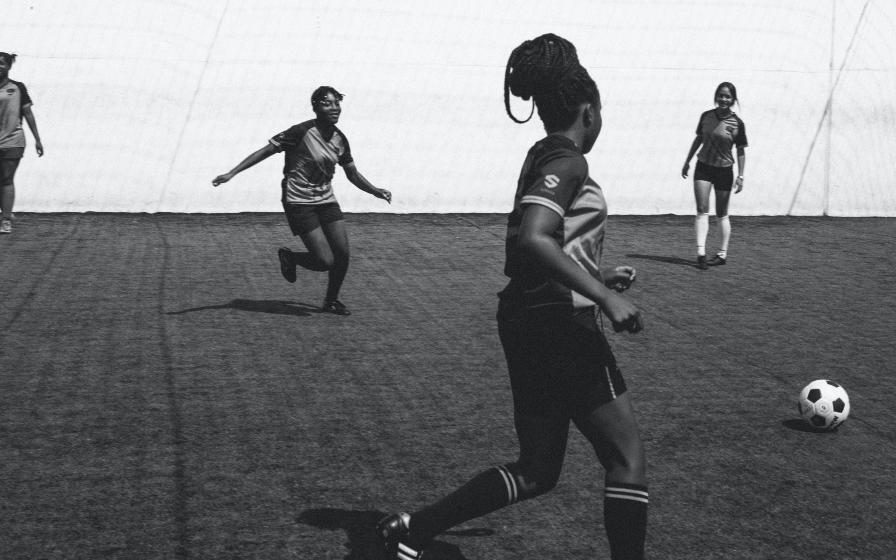
I want to start o by emphasising that there is not one homogenous perception of the AU, that can be attributed to all of its Black members. In
conducting our interviews, we identi ed a few common trends, but we were also struck by the breadth of our interviewees’ experiences.
e drinking and general ‘party’ culture of the AU cannot be shied away from. Wednesday nights, or sports nights as they are frequently referred to internally, o en revolve around clubbing and the inter-club socials that precede them. ese o en take place at bars, pubs and other similar venues. e “relentless” and “purposeless” nature of these events have led to feelings of isolation and disillusionment amongst a number of Black students. A social scene that “revolves around the consumption of alcohol, and in some instances, drugs”, falls foul of many of the cultural and religious values that have been instilled in the Black students we interviewed.
An interviewee described Rugby and Netball as “wild” and cited a “laddish culture fuelled by sex, drugs and alcohol” as
one of the primary reasons for their perceived alienation.
Peter, a third-year member of football, labelled this culture “shocking” and spoke of rampant peer pressure throughout Men’s Football speci cally. Peter told us that this pressure to drink le him feeling that he wasn’t truly “one of them”, and was instead the “odd one out”. He revealed that when he rst joined the AU, he found the environment “scary, daunting and felt a pressure to conform”. To combat feelings of isolation, Peter resulted to “assimilation and tone switching”. Whilst none of our interviewees said that they have experienced blatant racism in the AU, micro-aggressions like “hair-touching” are still prevalent.
Another one of the recurring themes of our interviews was the apparent disconnect between the Athletics Union and the African and Caribbean Society (ACS) the explanations for which were diverse. Two of our interviewees, who preferred to remain anonymous,
both cited the “cliquey” nature of the ACS as a potential barrier to entry into the AU. Peter suggested that at times there is a “victimisation mentality” in the ACS towards the AU, which puts people o joining before getting to know what it is like. One of the reasons for this is a lack of representation, or at the very least a perceived lack of representation.
Despite the notable shortfalls that came to light, following our discussions, we also learnt that the AU can be a positive place for Black people in the LSE community. One of the people we interviewed spoke of the fond memories they have of their social interactions within the AU, highlighting the discipline and motivation that can come from playing sports. By the same token, Peter remarked that even though he has faced challenges, he has grown signi cantly as a person during his time in the AU. His “interpersonal skills have developed and [he] has transformed into one of the leaders of the Men’s Foot-
ball 1st team”. Peter also cited the importance of being exposed to a variety of people and multiple perspectives as one of the reasons why he has valued his time in the AU overall. He hopes to play a leading role in bridging the gap between the ACS and the AU this year.
e purpose of this article was to highlight the Black experience within the AU. However, as an executive, we recognise the importance of addressing the issues raised over the course of our interviews. In recognition of the need for a more inclusive social scene and increased Black participation, we have set up a working group with members of the ACS to better gauge their opinion throughout the year. Moreover, on 19 October, the ACS is being given creative licence over our club night at Sway in a further attempt to boost black engagement.
We are proud of our “AU for All” slogan, but the ball is now in the executive’s court to prove that this is really the case.
Features 8
‘I feel like the odd one out’: Black experiences at the AU
Oba Agboola
AU Engagement Officer
OPINION
Students need more support in the present crisis, not less
Theo Brown Contributor
Illustrated by Yvonne Haberlach
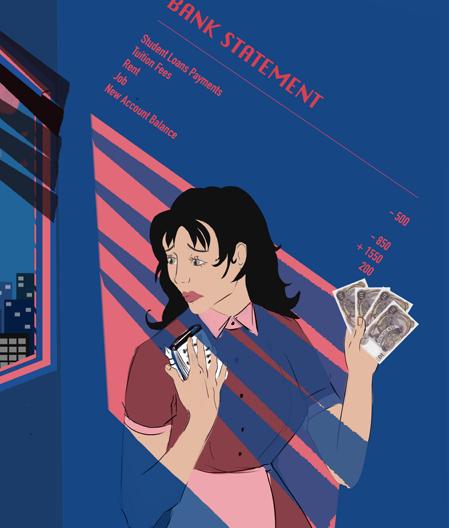
You could be forgiven for expecting that the government might intervene on behalf of students, given the present cost of living crisis. Or, at the very least, for assuming that maintenance support would increase to keep pace with inflation. After all, the government has professed its commitment to educational opportunity, and it is a matter of policy that ‘students do not suffer a real reduction in their income’. Yet you would be mistaken, as financial support for students in 2022/23 is set to fall to its lowest level in seven years.
So far, nothing has been done to counterbalance this loss of financial support. A £75 million scholarship scheme designed to help disadvantaged students (which is, in principle, a great idea) was being considered in February. Unfortunately, the scheme still – at the time of writing – exists only on the lips of cabinet ministers. Aside from this proposal, the government has intervened to cap the interest rate on student loans at 6.3%. Yet this does nothing to help current students and, since the majority of graduates do not begin to pay off the interest on their student loans, this will benefit only the minority of higher-earning graduates set to repay their student loans in full. Alongside this, the decrease in the level of financial support available to students has illustrated that there is something very wrong with how maintenance entitlements are determined. These are calculated based on inflation estimates which are, in theory, supposed to ensure that the real value of maintenance loans does not fall. However, the estimates used in calculations for 2022/23 were based on forecasts made in November 2020 (and were therefore woefully out of date). As a result, the calculated value of maintenance loans will fail to reflect the actual level of inflation: they will increase by just 2.3% next year, against an expected inflation of 8%.
The fact that the value of maintenance loans has been slashed in this way is a real cause for concern. It reads as an underhanded attempt by the government to avoid scrutiny and responsibility for their actions: by employing faulty data (as opposed to a transparent cut), it is possible to pretend that they have kept their word, while in reality breaching commitments made to students. And, as there is no mechanism currently in place to compensate for errors in the calculation of maintenance entitlements, these errors will carry forward into the following year in the absence of intervention.
More than this, the government is failing to uphold its commitment to improving educational opportunity. It’s important to remember that a fall in the real value of financial support will affect those from lower-income backgrounds most of all. While for some, the decrease in income will be offset by extra support from their families, for others this recourse is simply unavailable; or, if it is to become available, hefty sacrifices must be made. The academic success of an individual should depend on their merits, and not on the financial circumstances in which they find themselves. If we are to take this idea seriously, much more importance needs to be placed upon encouraging students from lower-income backgrounds to go to university and supporting them for the duration of their studies. Seeing as we have frankly terrible rates of social mobility compared to other developed nations already, it is a great shame that the current government does not appear to share this view.
Dealing with the rising cost of living in the new academic year will be particularly difficult for Londoners. Rent is becoming increasingly unaffordable in the city, with more and more tenants being required by agents and private landlords to bid for properties. More generally, inflation has been 1.5% higher in London than elsewhere in the country over the past six months, according to analysis by City Hall.
In my experience, it was not rare to meet a London student holding down multiple parttime jobs along-side their fulltime studies, even before the cost of living crisis hit. What worries me is how many of these people take these jobs out of necessity; without the extra income, studying here in London would simply not be viable for them– but do London universities take this seriously enough? After all, individuals who have no option but to earn alongside their studies are at an unfair disadvantage to their peers who can dedicate a greater proportion of their time and energy into their academic work. Oxford and Cambridge colleges, for example, forbid their students from working a job during term-time, instead tending to provide grants to students in need of financial support.
The rise in the cost of living is a problem for the London universities, too, not just for their students. For one, it will become increasingly difficult for school-leavers from less privileged families to justify studying in London as the cost of living continues to rise. Quite aside from feeding the reputations of certain universities (and particularly the LSE) as exclusive and elitist institutions, it is not unlikely this will translate into a loss of talent as increasing numbers of people decide that studying in the overpriced capital is simply not worth it.
However, if it can be said that the universities have some stake in and responsibility for the wellbeing of students, the case for universities supporting students in times such as these
should hardly need to be made. Unfortunately though, there has been radio silence from the LSE with regard to the cost of living crisis. Putting aside concerns as to whether the school’s provisions in place to support students financially are in fact fit for purpose, the school should at least communicate its position to current and prospective students, making assurances where possible and directing those in need to the support that is available. For a university that is often criticized for lacking a sense of community, expressing some level of care and concern for those who are struggling is certainly a step in the right direction.
9
Opinion Editor Sonja Belkin Alina Chen opinion.beaver@lsesu.org
Our cities are not prepared for climate change
Lily Whittle Contributor
Illustrated by Anoushka Guli
This summer has been hot. Exceptionally hot.
e UK hit 40 ° C for the rst time since records began (Met O ce), but the harsh reality is this temperature hike was not experienced the same by everyone.
ere have been reports of rising temperatures for years now, with ten of the hottest years on record having taken place since 2002 - the consequence of fossil fuel emissions fundamentally altering our biosphere. Heatwaves have become an expected outcome of human-induced climate change. Yet, if this heating is expected, why does it still feel like the government isn't doing anything about it for the people a ected the most?
A recent Climate Change Committee report found very few new builds are made to withstand these high temperatures, continually built with heat-absorbing concrete leaving “existing and new homes uninhabitable as temperatures rise”. ere has been a move to
infrastructure should see cities ‘meeting the needs of the present without compromising future generation’s ability to meet their needs’, but whose needs are even being considered?
In London, what we are seeing is a uent areas taking on projects such as localised urban greening or new air-conditioned o ces to tackle the heat, while poorer areas continue to see the housing stock replenished with cheap, easy to build, concrete high-rises which are essentially heat-traps. e CCC also found that new builds’ structural integrity will be compromised by the high temperatures, as the expansion and drying of materials will lead to cracking. With the appalling government response to the structural failures of Grenfell Tower, it is frightening to think how the increased structural failures of housing blocks will be dealt with. With the recent election of hard-core fossil fuel fan and former Shell employee Liz Truss, it is unlikely government sympathies’ will be with those facing the consequences of climate breakdown.
is is the same story for cities across the globe. With
make London ‘sustainable’, with Sadiq Khan making London the rst National Park City in 2019. While this encourages a focus on protecting and prioritising urban greening, it does not legally bind developers to make new builds climate resistant or stop them from building at all. London real estate is still a highly lucrative market, so without legal requirements for climate resistant building, developers will continue to build without consideration of the ever increasing pace of global warming.

e issue with governments throwing around the term ‘sustainability’ is that it is too vague and covers a multitude of actions, making accountability impossible. Sustainable
68% of the world’s population expected to be living in cities by 2050, it has never been more pressing to make our cities adaptable to the inescapable rise in temperature. Right now, in the UK, climate change is having a disproportionate e ect on low-income families and particularly people of colour. Inner city areas are some of the most deprived areas of the UK, yet feel the greatest e ect of heat waves due to the Urban Heat Island e ect. If you were in London for the heatwave, you were undoubtedly faced with the unbearable heat emitted by city structures. While many people can crank up the AC or escape to a nearby park or garden, this is not a privilege all Londoners have the ability to access and enjoy.
Short-term xes in response to heatwaves, such as reliance on air conditioning, have a knock-on e ect for the rest of the city, which only exacerbates the problem. Air conditioning units emit hot air into the urban landscape, impacting other city users. Where the vast majority of Londoners do not have access to AC, an electric fan might be the next go-to, but with the skyrocketing price of energy bills, this is not a luxury many can a ord. While the Met O ce has published advice such as shutting your blinds to keep heat out, this can be similarly unfeasible: households following this advice will have to turn their lights on during the day, adding an extra cost to their extortionate energy bill.
When staying inside became unbearable, many chose to spend the heatwave out of their homes. Unfortunately, poorer neighbourhoods o en lack the same immediate access to urban greening. Research carried out by the Runnymede Trust, the social and a ordable housing stock in London is largely made up of tightly packed high-rises, where access to green space per resident is much lower than in
more a uent areas, particularly as housing blocks rarely o er access to private green space. e insu cient housing provision in London is only part of the problem faced by working people during the heatwave. Commuting to work becomes a challenge too: with many city workers choosing the London Underground as their main form of transport, the lack of air conditioning and access to water transforms the tube into a lethal tin can. Without legislation de ning a maximum temperature cap for working, many workers were le with an ultimatum, to work in the heat - or not get paid.
ere is a common sentiment in climate activism that ‘we are all in this together’, claiming that the e ects of climate change are felt across the world, no matter who you are. e stark truth, however, is that we are not. ose who have had the least to contribute to increased warming are currently feeling its e ect the most, yet have the least resilience against it. Where low-income families in London may live more sustainably, travelling on public transport or having a smaller consumer footprint with lower disposable
incomes, they feel the heat the most when the temperatures rise. Collective action is a fantasy when the e ects are disproportionate. e e ect of the heat waves on our cities is only part of the story, but it perfectly illustrates the unequal consequences climate change forces on society. If we truly want to see our cities becoming sustainable, we need to see the social housing stock retro tted with heat-withstanding materials, reducing our reliance on polluting AC units, and equalising access to urban green space. Workers’ rights need to be protected so workers aren’t faced with the ultimatum of losing their jobs or facing lethal working temperatures. Only then will we achieve genuinely inclusive and sustainable cities that will be future-proof against the inevitability of continued global warming.
“The effect of the heatwaves on our cities is only part of the story, but it perfectly illustrates the unequal consequences climate change forces on society.”
Opinion 10
LSE Economics exams have failed us
Alina Chen Opinion Editor
Isuppose I still had some faith in the School’s capacity to sympathise, if not empathise with their students before the 2022 January exam. So the feedback of the Economics department came as an interesting yet frankly appalling surprise a er the EC201 Microeconomics January exam, in which they stated that the grade distribution was “now in line again with performance pre-pandemic”. Indeed, 24-hour online exams in the past two years have caused signi cant grade in ation, motivating the School to close the discrepancy as soon as realistically possible. e insistence to conduct exams entirely in person in January was presumably a part of the School’s e ort to retain the pre-pandemic normality, which unfortunately came apart as the end of term drew closer and Covid cases perked up.
Despite resorting to online arrangements, the Economics department succeeded in lowering the mean percentage mark in January exams from 68.7% in 2021 down to 60% this year for EC201. Nevertheless, the general consensus from fellow students contradicts the department’s explanation: they have attributed this signi cant change in grades solely to the “timed nature” of this online exam.

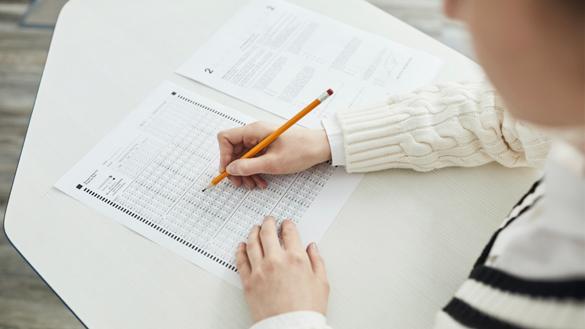
But is this really the case? I was by no means the only one who was surprised that the January Microeconomics paper was originally written for the purpose of an in-person exam. Due to the last-minute announcement for the change in exam format, the departments had no time to change the paper, which had already been written and checked. Had the Covid-19 situation not worsened as the winter approached, everyone on the EC201 course would have had to sit the same paper, close-booked, for less than half the duration of the actual online exam. is is because the Economics department had chosen to allocate another hour for any potential complications that may arise from online submission, which a lot of students ended up using as extra time for answering the paper. Nonetheless, many
complained of having to make use of the very last minute to nish the paper, if ever.
is summer, exams in many departments, including that of Economics, were conducted in person, which meant as students, we were confronted with an even bigger challenge than in January. And frankly, as someone who takes Economics modules myself, I walked out of the exam room feeling disheartened. I had spent all the
What are these exams really for? What skills are they training us for? What good do they do, when their sole purpose seems to be to narrow down the percentage of people getting a 1st or a 2.1, reiterating the bespoken prestige of a LSE Economics degree?
I have heard recurring complaints from students of different departments, especially of Maths and Finance that this year, the exams had been unusually and unreasonably tough.
an Economics degree at LSE is genuinely understandable in my opinion. Especially when it is meant to reward those who really have put in the hours. Yet, the length many professors took to raise the di culty of, for many, the rst ever in-person exam at university, appears excessive. Haven’t they overcompensated? How many students’ mental health hit rock bottom with the excruciating exam preparation period and the exams themselves? And why has “LSE Stressed” (an Instagram page that accumulated 193 confessions from LSE students from 9 April to 3 June) taken o in this particular exam season? Most importantly, was all of that necessary to educate a generation of ambitious, intelligent and cultivated young people?
possible time that I had to revise for exams, only for them to deal a crushing blow to my already shaky mental health during the exam season. e stringent time constraint put us in a position where we barely had much time to think through the questions, which were evidently harder than those in the papers from pre-pandemic. To give you a rough idea: we were having to answer ten-mark questions in under 6 minutes.
e more you spend on a question, the less time you have to answer the rest of the paperthe extra 2 or 3 minutes really add up for an exam like this. All of which got me thinking…
is comes as most of us face the rst in-person exam in years, some of us, the rst years and some second years, having not done a single in-person exam since GCSEs.

Yes, I suppose “normality” has been restored - it has become once again “di cult” to obtain a “good” grade in a LSE Economics exam, or rather it’s become even more di cult. e percentage of students receiving a 1st or a 2.1 this summer in EC201 is 32%, compared to 75% in 2021. But at what cost? At the cost of failing a stark 18% of the cohort. e logic of clamping down grade in ation to maintain the quality of
Instead of o ering more support and trying to understand students’ perspective, the university has been more focused on recovering their statistics.
I question the necessity in stretching a signi cant portion of the student body (to say the least) to their breaking point during an exam season. It should not have been like this. And I hope this does not go on. I hope at our university, known for the quality of education, exams will again be written to test the depth of our understanding and not with other ulterior motives that ultimately undermine students’ wellbeing.
Opinion 11
Scan the QR code above to check out the Beaver Breakdown podcast and find out more details about this piece!
"Yes, I suppose “normality” has been restored - it has become once again “di cult” to obtain a “good” grade in a LSE Economics exam, or rather it’s become even more di cult."
SOCIAL
EDITED BY MATT SUDLOW
LSE Conspiracy Corner!
 by LIV KESSLER & illustrated by XI CHEN
by LIV KESSLER & illustrated by XI CHEN
Sudlow’s Soapbox Vol. 1: Matt’s Tip Jar

 by MATT SUDLOW & illustrated by CHARLIE TO
by MATT SUDLOW & illustrated by CHARLIE TO
e whistle sounds for the start of the second half. Sport Editor Matt Sudlow receives the ball. He prepares to launch it up- eld for another year of top notch sport reporting and much loved content. e ball leaves his foot… oh fuck, wait a second! is isn’t sport! is isn’t a football game! But I am Matt!
I guess I need to produce some social stu then.
As newly-elected editor of this Social Section, I recognize the privileged position I am in. To be in charge of such a historically wide read part of the paper gives me quite the platform to speak. To make people listen to my opinions. Forget the soapbox, this is more like a balcony. Above a square!
As strong as the temptation is to abuse this microphone of omnipotence, turning the vast Social Section audience into my very own fan base (shout out to all you Sudlovers out there), I’m going to use it for some good. To make me feel like a decent person and save my wretched soul. So, to all you rst years who are still reading this article (who am I kidding, hi Mum!), here are the top three tips I’ve learned for getting by at LSE.
First, but not least, check exactly where the cameras recording your lectures are positioned. e prying eye of Big Brother is watching constantly, ready to expose you and your computer screen full of Minion fan- ction (Kevin and Stuart, you just deserve each other!). I mean, this isn’t from personal experience. Oh no. Just something I’ve heard. From a friend. But you don’t know them, they go to another school!
In this year’s Social Section, we will investigate some of the most mysterious conspiracies on campus! Uncover some of the biggest mysteries!
Do the rats in the library pay tuition?
Is the number one cause of breakups this September been bragging about Summer Internships?
What’s the deal with that study that shows 75% of students only come to campus to “look cool” and “get some”?
Disclaimer: ese are simply conspiracies, that have been put in a corner. Not facts, nor have they been placed in the middle of the room.
Next, but not least, in a very similar vein, whatever you search on the Library computers will appear on that big fucking LED display on the wall outside. You’ve probably seen it and wondered what it was. Well, I’ll tell you. It’s what exposed my dessperate search for textbooks, and by textbooks I mean adult diapers. e thought of it is the main reason I wake up every night in a cold, wet sweat. Well, that and “global warming”.
And last, and least. ere’s one item you can nd all around campus that will prove even more useful than that management degree. Not only can it wrap your sh for the next morning, but it can act as an umbrella on a mildly rainy day, or perhaps help you deal with a pesky y. at is, of course, e Beaver (what you are reading now). Pick up a copy. If you think of your own use, message me at idontcare@gmail.com.
And last, and leaster. Welcome to this year’s Social Section. Edited by me, and maybe you (MT elections are coming soon). You should be mildly excited, I know I am myself.
Horror-scopes
by VANEEZA JAWAD
& illustrated by CHARLIE TO
Libra - Mercury just entered your sign today, which means you have more reason now than ever to be annoying! at isn’t to say that you’re not usually annoying. You are, I assure you. Most people don’t see it under your penchant for overdressing. But I see through you, Libra. I’m watching you. Happy birthday!
Scorpio - Contrary to popular belief, you can’t be sexy and mysterious if that’s literally all you talk about. It takes away from the appeal. is week, say less.
Sagittarius - Jupiter is in retrograde so feeling not like yourself is actually your truth right now. Own it! You may feel like shit, but everyone’s actually very happy you’re not the loudest person in the room right now.
Capricorn - We all know there’s no one more upset than you about no longer being able to listen to lectures online at 2x speed while we balance spreadsheets at our day-jobs. But money is temporary, Capricorn. GV102 is forever. is week, make a fuss in class. You deserve it.
Aquarius - ere are more people than you think able to see through your socialpariah-posing and nd what you truly crave: attention and community. I know it’s hard, but don’t be pathetic about it. You are just like other girls! Revel in it.
Pisces - e cutesy act only ies with people who are in love with you, and as you’ll learn this week — not many are. And that’s okay! ere are worse problems to have, like being too sensitive. Oh, wait. Never mind.
Taurus - Here’s the thing: you’ll get the big-house-fast-car-huge-paycheque fantasy eventually, but what’s the point if where you are right now doesn’t feel like home? Tell a friend about your worst fears. Chances are they already know because someone showed them your nsta, but at least they’ll be hearing it from the source.
Aries - You know, it would be harder for people to typecast you as a hotheaded mess if you ever did something that actually proved them wrong. A lot of your anger this week is imaginary. It’s not real! What’s that, am I gaslighting you? at isn’t even a word.
Gemini - You have a spending problem this week, which is hardly news. What is news, though — concerning news — is that haircut you’ve been considering. Stop it. Unless you mean to scare o your secret admirer. I know! We’re all shocked you have one too.
Cancer - is week, you’ll inadvertently teach your friends that the only two primal urges that exist in this world are ugly-crying and manipulating unsuspecting strangers. And then you might need new friends. Don’t be afraid to say no, even when you really want to say yes.
Leo - Every re ective surface will bend to serve as a mirror for you. You are the centre of the universe and everyone who says you aren’t is a hater. is week, be more delusional. It’s good for the economy.

Virgo - How do you manage to sound so shrill even when there’s nothing wrong with your voice? No really, it’s a skill that should go on your LinkedIn. Speaking of, living in a at-share with people you hate does not count as voluntary rehabilitative community service, and that G-Sachs recruiter is totes suspicious. You still have time to delete it!
A Cultural Fanatic’s Guide to London
 by LIV KESSLER & illustrated by CHARLIE TO
by LIV KESSLER & illustrated by CHARLIE TO
Once you’ve hit the National gallery, e Tate Modern and the British Museum, where do you go? What unites all cultural fanatics is the unquenchable thirst for new things to see and explore. In this recurring feature, I o er my personal favourites for those who want to go beyond the beaten path.
First up, e Royal Academy of Arts.
ough their permanent collection is pretty underwhelming, focused more on the history of the Academy itself, the exhibits are always stunning. e Francis Bacon exhibit last year was particularly terrifying. A mix of inhuman shapes and faces with hints of red where a mouth should be. is haunted me for weeks a er and made me rethink my concept of art as a product of beauty.
e crown jewel of the RA (a ectionate surname of the Royal Academy for those in the know), is its Summer Exhibit. If you are feeling a little too corporate during your Summer Internship, this will feel like an artistic release. You could spend hours strolling through the eleven rooms of the exhibits and never see it all. Artists appointed by the Royal Academy Walls are each given a room in which to curate and expose their favourite pieces of contemporary art. is exhibit becomes a celebration of the vibrancy of contemporary art and culture, and also acts as an auction for the pieces, with each red dot representing a purchase. e intersection of art and commerce is never more obvious than when you start searching for those little red dots.
I went four times last year and needless to say, it wasn’t enough. My recommendation? Get a yearly pass with a friend for £60. You have unlimited access to all exhibits, can bring a free plus one, and get a 5% discount at the museum shop.
Next up, Sir John Soane’s House
If you are a time constrained cultural fanatic on a budget, who doesn’t want to be over 5 minutes away from the LSE campus, this one’s for you. e collection of Sir John Sloane: a popular 19th century architect with a compulsive hoarding habit. Friendly volunteers will tell you fun facts about the man who once held a three day masquerade ball in celebration of his newly acquired sarcophagus. It’s glorious, it’s kitsch, it’s ridiculous; it’s perfect. Just check it out if you have an hour between classes. e cherry on top: visits are totally free.
REVIEW

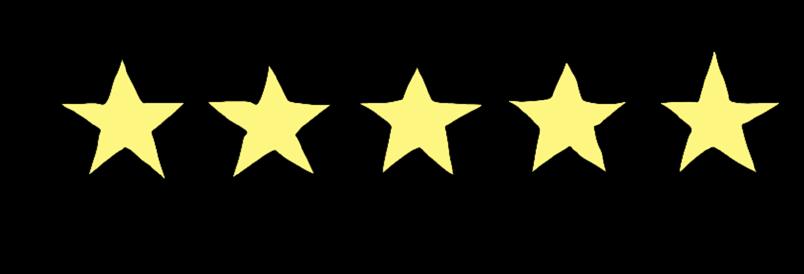 EDITED BY BEN HELME
EDITED BY BEN HELME
Introducing our new subsection!
In every print issue this year, the Review section will include one of our contributor’s ‘All Time Best’. is is the cultural work—be it lm, song, album, book or other—that they most recommend: a work that they believe everyone should experience.

For me, that work is ‘Cold War’. Pawlikowski’s 2018 masterpiece focuses on the desperate relationship between Zula and Wiktor, two musicians in post-second-World-War Poland. Based on Pawlikowski’s own parents, the protagonists are treated with deep empathy despite their aws. ey feel real in their complexity and this honesty shapes the lm’s soul. I believe that beyond being a romance, tragedy or historical drama, this is a lm about people facing extraordinary challenges, and trying to nd solace. e cinematography and soundtrack are breathtaking (hence a poster in my room and some songs on my playlist), yet they compliment—rather than disguise—the intelligent plot. e years dri past over just 90 minutes. It is the only work that I truly believe couldn’t be improved upon, and a worthy rst recommendation for our new subsection.

“A Summer, Staged”
By Syed Zaid Ali
“Daddy” A Melodrama at e Almeida eatre
Honestly, this wasn’t a play I looked forward to much at all. I knew that the only reason I’d even consider going was to see Claes Bang (whom you might recognise from e Square, e Northman and/or BBC’s Dracula) on stage.
I’m not sure that I can articulate how grateful I am that I saw it anyway.
e play follows a young black artist Franklin (Terique Jarrett) who comes under the patronage of Andre (Claes Bang), a middle-aged, white, art collector. eir interactions develop into those of an intimate romance, and what results is a gripping exploration of power dynamics within this interracial, intergenerational relationship.
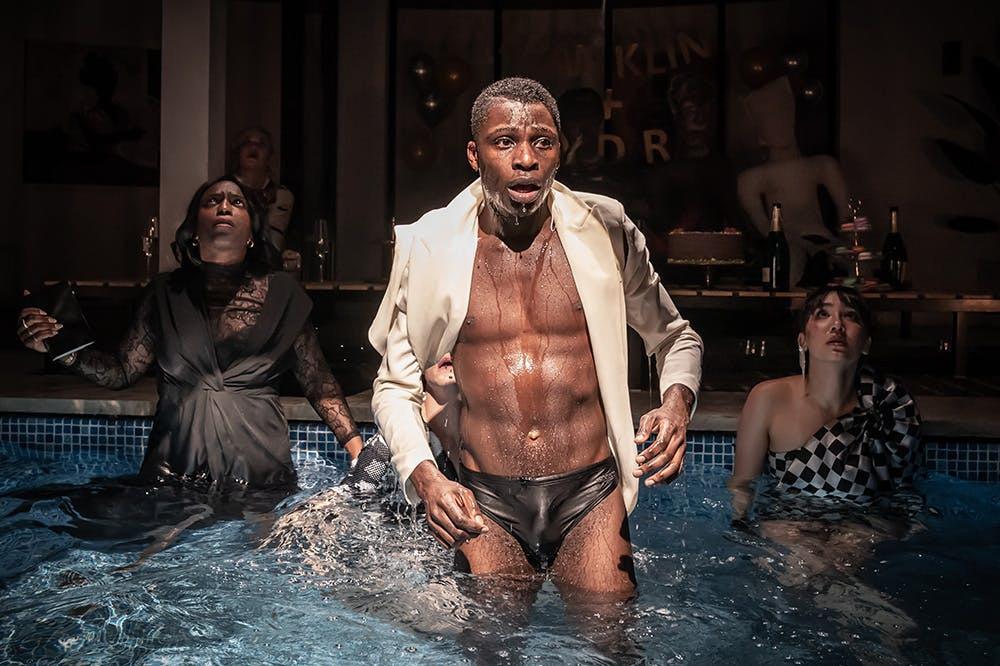
e set design is one I’ll never forget. Including an actual swimming pool built into the stage, the set is redolent of the paintings of David Hockney such as A Bigger Splash or Pool with Two Figures. is is particularly salient when one considers the focus both the writer Jeremy O. Harris and Hockney place on the male form: the former calling for Franklin to be “dripping wet and wearing only a speedo” in the opening scene, as is expected of the setting. Just beyond the pool, there is a “mid-century modernist villa, one of Los Angeles’ most enduring architectural tropes”—as described by Miles Gertler in the programme—situated in the “conspicuously white Bel Air”, which also serves to elucidate the con icts between Franklin and Andre.
Symbolism here is executed precisely. As an artist, Franklin focuses on dolls— an object most closely related to childhood and domestic settings. is ties into the title of the play, which repeatedly manifests itself throughout: “Call me that again,” Andre tells Franklin in a particularly charged scene of roleplay. “Daddy” also happens to be what Franklin titles his exhibition of dolls. Furthermore, we occasionally hear a phone ring, but no one answers—likely Franklin’s absent father, with an attempt at reconciliation. As a subject matter, this has been tackled countless times in many forms of media, but “Daddy” is one in which it is treated skilfully, forcing us to draw connections between these relationships that Franklin has, with Andre lling in the void le behind by his father.
“ e Glass Menagerie” at e Duke of York’s eatre
Largely known as the play that managed to launch Tennessee Williams from obscurity, e Glass Menagerie follows Tom Wing eld as he recalls his memories of living with his mother, Amanda (Amy Adams) and sister, Laura (Lizzie Annis) in the decade following the Great Depression. e plot centres around Amanda trying to secure a gentleman caller for Laura, who nds herself unable to nd a job or meet anyone as a result of her emotional and physical frailty, and the struggles that Tom faces as the breadwinner following his father’s abandonment of the family.
Anyone familiar with Williams’ breakthrough hit will appreciate the importance of staging in presenting the recollections in this so-called ‘memory play’. It is clear that this production at the Duke of York’s eatre understands that importance. e titular collection of glass animals takes centre stage in modern glass shelving on a raised platform where the main action takes place – it stands out anachronistically against the period furniture placed around the platform, as it is the only piece of furniture on the practical stage. is choice by set designer Vicki Mortimer underscores the importance of Laura in Tom’s memories of the Wing eld household, since the delicate glass sculptures were taken care of by her. Additionally, since present-day Tom (Paul Hilton) and past Tom (Tom Glynn-Carney) are played by two actors, the set allows for the audience to observe present-day Tom – who o en walks around to the raised platform as the past Tom acts out the memories on top of it – react in real time.
Image from e Guardian
Image from Apollo Magazine
Image from e Guardian

Where the staging succeeds, the direction taken with the characters falters. rough a close reading of the text, I empathised with Tom. His guilt for his decision to leave home – e ectively abandoning his crippled sister with his overbearing mother – should come through quite easily, but the love he has for his sister hardly ever came through in this production. is may have been caused by the direction they took with Tom, dividing up his role between two actors, which could be detrimental to an audience member’s attempts to relate to him.
e way Amanda was presented could have been handled di erently as well. e presentation here is one that feels incredibly sympathetic – perhaps too much so, as there are moments where she should come across as controlling and di cult, but doesn’t. What results is a di culty in truly internalising Tom’s motive for leaving; this ends up seeming rather trivial, since it seems as though he’s leaving a loving household for no real reason.
In the end, viewers might end up feeling puzzled as to why this play helped cement Williams as one of the great American playwrights, since the characters’ motives are muddled somewhat. Despite all this, the signi cance of what he called ‘plastic theatre’ – using non-realistic staging to convey subjective experiences – comes through with this production’s impressionistic set design.
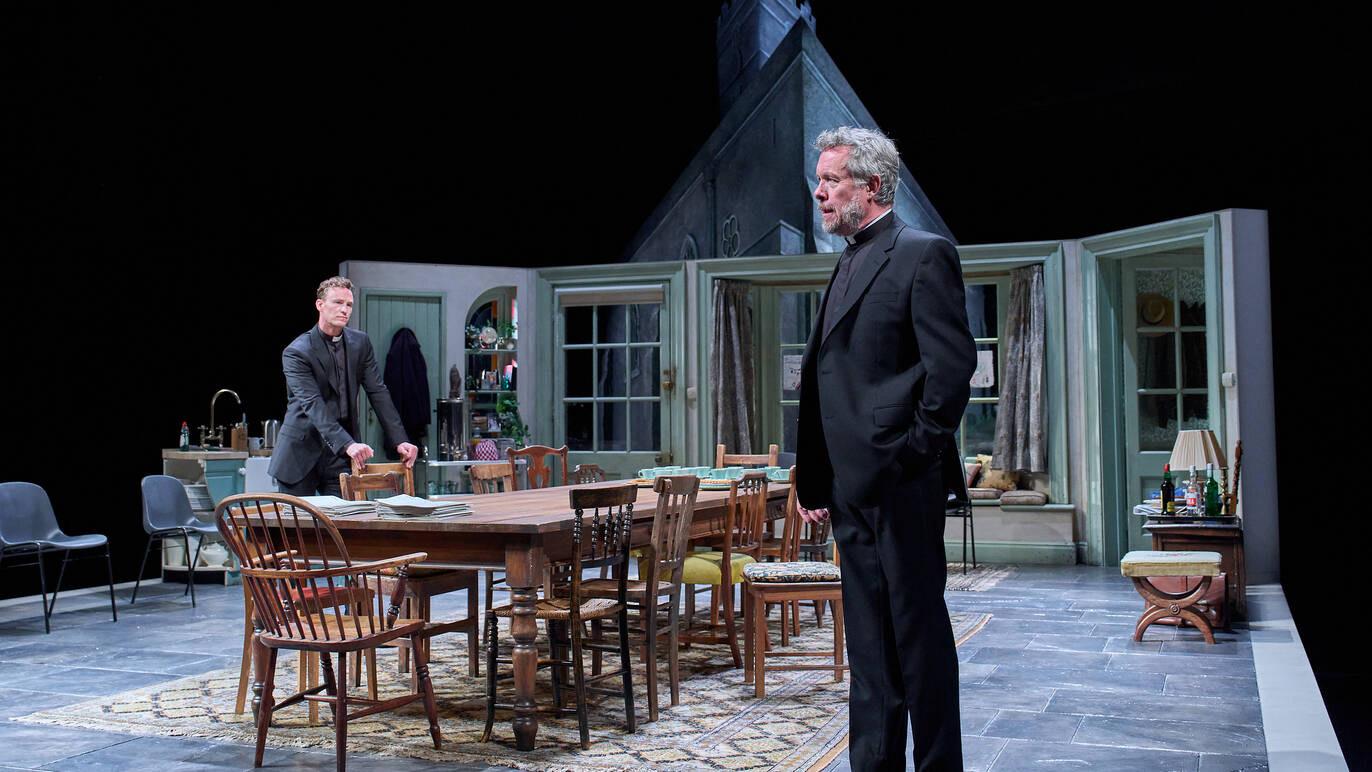
Regardless of his faults, it’s di cult not to sympathise with him, as we sense his humanity; this is a man nding purpose where there seems to be none. Perhaps it is also a result of the good amount of laughs the script produces that keeps us from turning against David – the humour tends to be sharp and witty despite the events that make up the play.
e rst half of the play is solid, and ends strong with an explosive confrontation between the dead child’s mother, Tina Southbury (Sarah Twomey) and David, who keeps opposing her wishes to have balloons for the funeral. Jennings’ performance is fantastic – as is expected from a three-time Olivier Award winner – but it is consistently matched by Twomey in this heart-wrenching scene. e second half however is steeped in a little too much melodrama. Nevertheless, the play manages to work for me, making for a good a ernoon at the Bridge eatre.
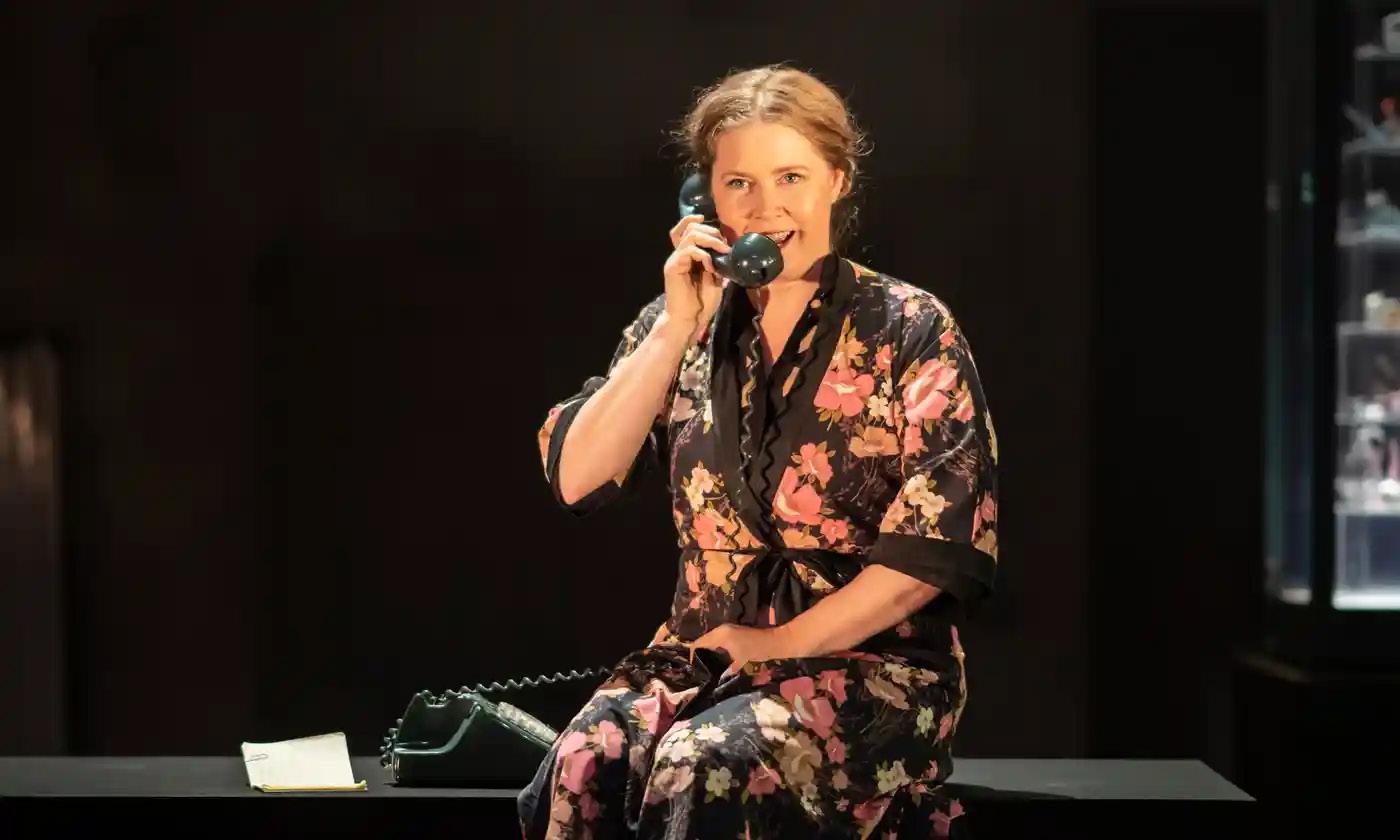
Rina Sawayama - Hold the Girl
Solid Pop that Plays it Safe
By So a Lammali
“ e Southbury Child” at e Bridge eatre
e Southbury Child poses questions about the role of the church in an increasingly secular society. As the plot follows, when a family turns to the church in their time of need, they are seemingly let down. Following the death of a young girl, her family approaches the local church to hold a funeral service for her, and they ask the priest David (Alex Jennings) to have balloons in the church for the service. David refuses. ey try again, and then again, but David doesn’t budge. is seemingly mundane request produces the central con ict that drives the play, as it balloons into a wider movement amongst the townsfolk, with them even printing T-shirts protesting David’s tenacity.
e balloon asco may seem like a rather odd hill to die on, as one reviewer from e Guardian points out, but the complexities it reveals within David’s character are what kept the play engaging for me. Struggling with drinking and a failing marriage, he likely views his unwillingness to compromise as an act of devotion; a way to “prove himself worthy of God”, as that same reviewer mentions. rough a more skeptical point of view however, one might consider his position being almost all that he has le in this world, and so he exercises the power it grants him. What results is something of a God complex, since he believes that caving in would be “giving them what they wanted, not what they need”.

Rina Sawayama’s debut album SAWAYAMA, released back in 2020, was led by well-produced, intoxicating, electro-pop bangers that are full of energy and easy to dance to. e lead single of her second album, Hold e Girl, suggested that we w expect a similar sound. It remains the album’s highlight.
e rest of the album, however, is more re ective and earnest. e opening track Minor Feelings is a mystical ballad. is strong opener is then followed by the title track Hold e Girl, which at rst seems to be another ballad before the chorus transitions to a house beat. It retains a slight orchestral sound through violins at the end of each chorus. Catch Me In e Air is another belting ballad, reminiscent of 2000s pop. It is a tribute to her mother with verses that switch between the child and mother’s perspective. It’s a moving song that would be good for karaoke, if only it were a bit catchier.
Unfortunately, a er these strong opening songs, the album’s middle section feels lacking. Forgiveness is another sad pop-ballad belter that falls into cliches. Holy (Til You Let Me Go) is about her experience at a religious all-girls school and has an electric build up, building anticipation for a potential beat drop before settling as another pop ballad. Perhaps the most interesting song, compositionally, is Your Age, starting o with a banjo ri and then introducing a thumping beat and a pop rock sound. Its strong production is let down by an underwhelming chorus. Imagining is full of the energy that the previous few songs lacked, blending R&B with Blink-182style guitar ri s . Frankenstein and Hurricanes are both heavily inspired by 2000s pop rock. e former, with its enjoyably shouty chorus, is the better one.
e nal three songs nish the album on a far more demure note; they bring a further deterioration in quality. Send My Love To John is an acoustic ballad, written from the perspective of a mother apologising for not being able to love their queer son due to their traditional religious beliefs.
Image from Timeout
Phantom is similarly both inspirational and emotional. To Be Alive closes the album with a hopeful ballad with a belting chorus. It ends up feeling repetitive.
Rina clearly has many ideas but struggles to bring them all together in a cohesive way. e ambition shown in attempting many genres, sometimes in the same song, is good, but it falls short of great, mainly due to overreliance on pop cliches. e in uence of 2000s pop rock is hardly a shortcoming but it causes everything to feel a little dated. ere’s a near-constant sense that “I think I’ve heard something like this before”. It’s a very solid album that doesn’t break any new ground nor does it reach the heights of her previous work.
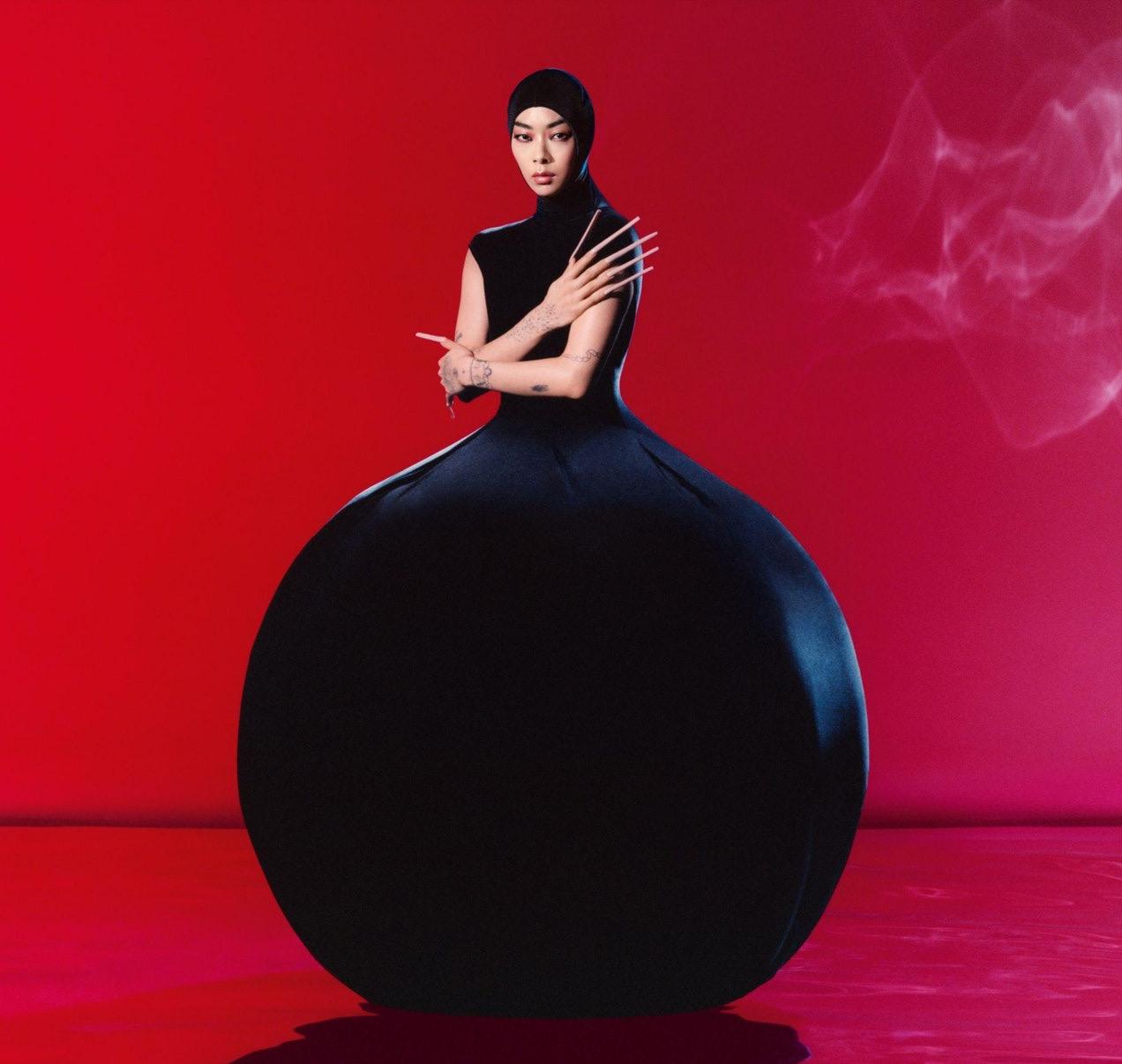
Just as in the book, Atticus views human beings as inherently deserving of respect regardless of their actions. What does change, however, is that here the children decide for themselves what and who is right, and challenge him on it.
Sorkin gives a louder voice to the black housekeeper Calpurnia, played movingly by Pamela Nomvete, and Tom Robinson himself –a digni ed Jude Owusu. is allows Atticus’s even-handedness to be drawn out as a relative luxury a orded by his privilege.
Coyle plays Atticus as an honest, self-deprecating, a ectionate man, but a awed one with ashes of temper and a certain satisfaction in his own intelligence and moral rectitude. Coyle’s Atticus is constantly grappling with himself to do the right thing; he is not the paragon of saintly virtue he appears in the book. But this humanity makes him all the more fundamentally decent, and the extraordinarily brave things he does do – notably facing down an entire lynch mob on his own – all the more remarkable.
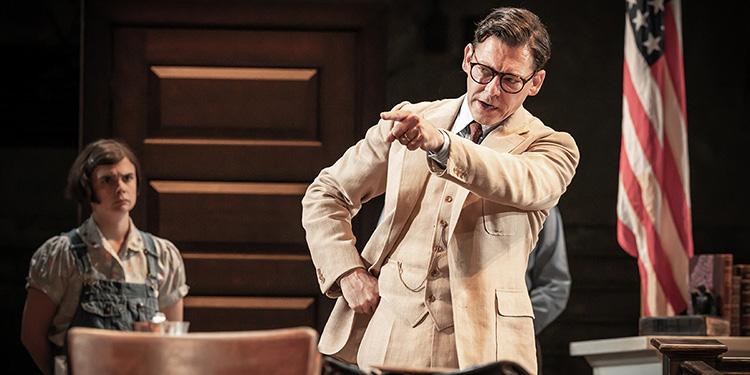
Scout, Jem and Dill are all played by adults – a high-risk venture which pays o remarkably well. Scout, the feisty, wide-eyed tomboy is glowingly played by Gwyneth Keyworth; Harry Redding makes an astute professional debut as troubled, self-possessed Jem, while David Moorst skillfully relieves tension as Dill, their lovable marionette puppet-like friend. e trio’s interactions are o en comedic –they have some brilliant one-liners– but are also littered with pathos as the children’s collective loss of innocence is movingly played out.
e drama of the courtroom is when this production comes fully alive. e testimonies of both walking thyroid Bob Ewell and his snake-like daughter Mayella (Patrick O’Kane and Poppy Lee Friar respectively) are lled with tension, humiliation, fury and betrayal. ere are modern-day resonances of Trump’s rust-belt le -behinds in their characterisations, which feel utterly uncontrived; both father and daughter sneer at Atticus’s intellectual elitism and seem to grieve their supposed loss of a clear societal purpose.
Image from Pitchfork
To Kill a Mockingbird at e Gielgud eatre
How do you solve a problem
like Attius Finch?
e drama feels less taut post-trial, where the events end up feeling like a hastily added coda. Despite this, the near three hours y by. Every characterisation is beautifully rendered amid Miriam Buether’s intricate cut-out set, which slots in and out of the derelict warehouse space where the majority of our narration takes place. Transitions between the austere courtroom and the peachy, sunset-drenched porch of the family home are smooth, and Jennifer Tipton’s lighting adapts to mood and time of day perfectly. e production is a restless, probing, engaging piece of theatre that celebrates and scrutinises Harper Lee’s masterpiece with real poignancy. A must-see for all.
By Sarah Coyle
Since the 2015 publication of Harper Lee’s second novel, Go Set a Watchman, which reveals Atticus Finch to be a racist, one struggles to hold our lead character with the same regard with which he was once viewed. Even Atticus’s original incarnation as a quietly digni ed white saviour defending an innocent black man in a courtroom of racist jurors feels anachronistic in the BLM era. So in any new telling of our tale, one is faced with the question– how do you solve a problem like Atticus Finch?
ankfully Aaron Sorkin, of West Wing fame, nds an e ective way to create a new, self-assertive version of our well-known tale. By having our original narrator, Scout, share narrating duties with her older, more critical brother Jem, and their out-of-town friend Dill, Sorkin allows the lawyer’s moral inconsistencies to be drawn out without undermining his inherent goodness.
e story remains roughly intact: Atticus Finch, a small-town lawyer and father to Scout and Jem, defends Tom Robinson, an innocent black man who has been accused of rape by a white woman who is being sexually abused by her father.
 Image from London eatre
Image from London eatre
PART B
edited by Anouk Pardon
Independence and Beauty in the Ukraine War
By Manon Martin & illustrated Xi Chen
Don´t you o en think it's crazy what a di erence a year makes? Take the example of Ukraine.
Just one year ago, August 24 was a festive day. Ukrainians peacefully enjoyed their 30th independence anniversary and its traditional military parade. is year's anniversary was marked by a new generation of pilots leading Kyiv's military and civilian aircra . One of these pilots, Anton Lystopad, had just been awarded the Order for Courage by President Volodymyr Zelensky.
But only a year later, Independence Day does not hold the same meaning for Ukrainians. Russia is trying to annex their country, and many lives have been lost. Among them is also the pilot Lystopad, who died in combat in August. His story is one of many that show the sacri ces Ukrainians have made for their country, and that they are not ready to give up their independence.
Six months a er Russia's full-scale invasion, everything changed, and so did Ukraine's Independence Day. Festiveness was replaced by distrust, and a ghost parade: an artful display of captured Russian tanks, shattered military trucks and stilled artillery pieces throughout Kyiv's city centre.
But can we mix art and war? Can we still beauty in war? For Ukrainians, the answer is yes. carefully assembled ghost parade was not only artful, but also a way for Ukraine to mock Russia. It showed Putin that the parade he initially planned in downtown Kyiv in February to mark his invasion did not go as planned. Furthermore, letters written by Ukrainians to those spending this year's Independence Day away from home are also art. eir optimism regarding the future of their country is proof that beauty can still be found, even during war. Art can still be appreciated and used to recover from the horrors of war.
Ukrainians worldwide joined the Free World gathering action, which encouraged them to reunite across cities and show their support, using art as a weapon on this special day.
Ukraine was beautiful on August 24 2022, because it was a proud country.

Want to learn more about this article? Scan the QR code below to check out our Beaver Breakdown episode on this piece-- and more!


ey celebrated their soldiers’ courage, independence, and solidarity. Zelensky says it best in his speech that day: "Every new day is a new reason not to give up. Because, having gone through so much, we have no right not to reach the end". Peace is not enough. Victory is the only way.
e media captured proud Ukrainians triumphantly raising their ag on Russian tanks, as children played around them. e Motherland monument, a 62 meters-tall statue in Kyiv that celebrates the Soviet Union's victory over the Nazis, was beautifully illuminated with the e government also organised festive prayers e Russian invasion seemed forgotten. is day represented a pause for Ukrainians to celebrate freedom and independence.
While this Independence Day may seem trivial compared to previous ones, this one st stands out as an act of enormous courage ance. Many of Kyiv's residents feared a potential attack on the city and decided to spend the day at home, even as the festive mood grew throughout the day and into the night. Among the brave Kyiv residents who visited the ghost parade was Vasyl is 68-year-old Ukrainian has not missed one Independence Day celebration since the collapse of the Soviet Union. To him, this year's Independence Day felt ght between freedom and domination.
ghting against a country trying to take their independence, Ukrainians today, more than ever impress the world with their courage and dedication to freedom. is year, an artfully assembled ghost parade symbolised its opposition to the enemy and its belief in their independence. Perhaps next year Kyiv will not be decorated with a ghost parade, but owers and a sentiment of
Tightrope Walkers

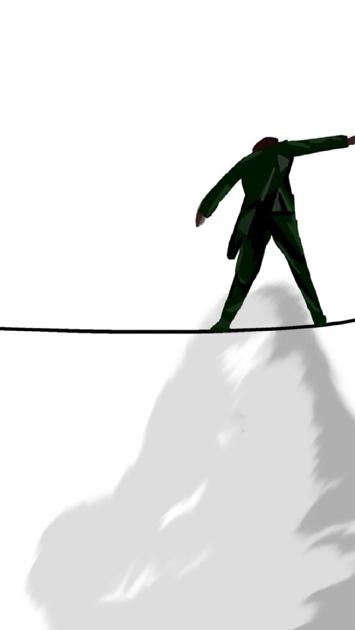 By Anouk Pardon
& illustrated by Sasha Varpahovsky
By Anouk Pardon
& illustrated by Sasha Varpahovsky
e woman on the train had big watery eyes and whenever she laughed she rocked back and forth and threw herself back into the tattered, red seat so that strands of dark grey hair fell out of her bun. Her girlish laugh did not t her wrinkly face and the many lines around her eyes but I thought she was adorable.
ere was so much gentleness in her and her ngers her voice and her smiling mouth which could not stop talking about her husband and her children all grown and the small village she lived in as a young girl this little village next to this big, silent forest which would never quiet down.
It was summer and we looked like we were burning like our hair was on re and nothing could extinguish it not even the hot sand beneath our feet the piercing wind that made us all teary or the water in front of us which stretched itself like a vast, silvery plane right below the horizon.
It looked like we could skate on it. Like it was solid and it would hold us and we could walk on it like water striders carefully and light-footed to some place beyond or simply to the other side of the pond.
My friend was watching her shadow intently and a ectionately as if she loved it.
And I thought about sleeping cats in the sun about us lying on that big, green carpet in the living room just one year ago
Small Beautiful ings: A Long Plane Journey
 By Hila Davies & illustrated by Sasha Varpahovsky
By Hila Davies & illustrated by Sasha Varpahovsky
I am a notoriously anxious yer. I begin packing at least a week before, will pick my plane meal in advance, and always have emergency ‘anxiety crackers’ on hand. So to me, there is no greater feeling than the blissful euphoria of nally getting in the air.
All around you, a hundred odd people are experiencing the exact same sensations as you. People from all di erent walks of life - a woman on a business trip, a man on his way to surprise his long distance ance, a baby on its rst ight, eyes wide open (probably also screaming), about to witness new lands and new smells for the rst time. A student, travelling across the world, plummeting away from everything they know, about to enter a whole new life. Personhood and responsibility are erased, identities become based on seat number and whether you chose “the chicken or the sh”. We enter a state of liminality with a group of strangers we will probably never see again. We breathe the same air, we see each other in our embarrassing plane clothes, and wash our hands in the same sink. I think there is something intrinsically beautiful about a group of people, together, on the brink of a new experience. Sure, seeing a stranger’s bare feet (you know who you are, Seat 51K…) is never pleasant, but it’s kind of a nosy person’s dream.
Don’t get me wrong, the actual take-o bit is objectively awful. Stomach dropping, head racing, that weird feeling when the wheels rst leave the ground - a feeling I’m convinced the human body was not meant to feel. It’s familiar, but not. Uncomfortable, but in some ways I think it’s one of the only times our brains can fully relax. Strapped to an aeroplane chair, we are forced to give up all agency, hand-held while racing through the air at impossible speeds.
Control is not an easy thing to give up. Living in London, I nd it extremely di cult to put my brain into, excuse the pun, auto-pilot mode. e bustle of the city conditions you to be constantly aware, constantly thinking, constantly on stand-by. But, strapped to a plane seat, the Big Smoke brain nally gets a chance to have a nap. Maybe this is a reach, but sometimes I think being on a plane is the closest we can get to recreating what being in the womb must have felt like. Ok, it’s no perfect dupe, but let’s break it down: all your nutrients are brought to you, there’s pretty much nothing else to do other than sleep, and if your ‘vessel’ breaks down, you’re basically screwed.
Beyond the chaos and anxiety, strangely, I think that moment of take-o is where I nally feel an inner peace. e rubber band snaps, the tension releases, and that feeling of letting go is like a balm for the soul. For the next however many hours, I get to exist separate from time and space, and suddenly, my mind begins to quiet.
when the sun wandered from east to west and you could follow its journey by trailing speckles of golden light on the warm kitchen oor which looked like forgotten, yellow confetti from a party just the night before. Everything was so pretty and beautiful when we were tightrope walkers and lazy without any shame when there was nothing to do but so much to take in so we woke up, breathed and went back to dream.
So if you’re an anxious yer like me, I implore you to do two things next time you’re on a plane:
Look out the window. e views are pretty ipping great and it is the perfect time to romanticise your life. Put on a killer movie soundtrack, stare wistfully at the clouds creating a sea beneath you, and wham, bam, thank you Samyou are the main character.
Be nosy. Listen in to that intense gossip session in the seat behind you. Figure out where the person behind you is travelling to. Pick out accents, create family units in your mind, play Sherlock for the day and it’ll make the time 100x more interesting. We are programmed to create stories - so let yourself be overtaken by a little ‘Once Upon A Time’.
Let go, let your body sink, and enter ‘plane nirvana’. Let yourself transcend space and time for a day. Become liminal. You got this.
SPORT EDITOR WANTED SPORT EDITOR WANTED
e Sport section reports on LSE speci c sporting events, such as the latest scores lines and results, as well as engaging with di erent LSE student athletes. It also covers developments in the international sport community and o ers student perspectives on global sports events. Finally, the goal of the Sport section is to create a more direct and active engagement with the LSE student body so as to engage with the community of sport lovers at LSE (which we can nd within our beloved AU)!
If you have some experience with editing, a willingness to learn, and are ready to make a commitment for the year, the Sport Editor position is for you!

e Beaver is a fantastic community to join! We are a really tightknit dedicated team and we aim to put our very best towards e Beaver.
If you are interested, message @thebeaveronline on Instagram or email editor. ipside@lsesu.org.
Choosing Hands O to be the rst Flipside interview this year was a no-brainer. Witnessing the continuous work and effort from Hands O over the last two years made it an easy choice. e idea occurred to me as I stumbled upon Loïc and Vandana holding the Hands O stall at the Welcome Fair. Hands O is an LSESU campaign raising awareness and pushing for improved policies on sexual assault on and o the LSE campus.
I had the chance to talk with three Hands O members: Sewon Hwang, Namitha Aravind and Vandana Venkataraman.
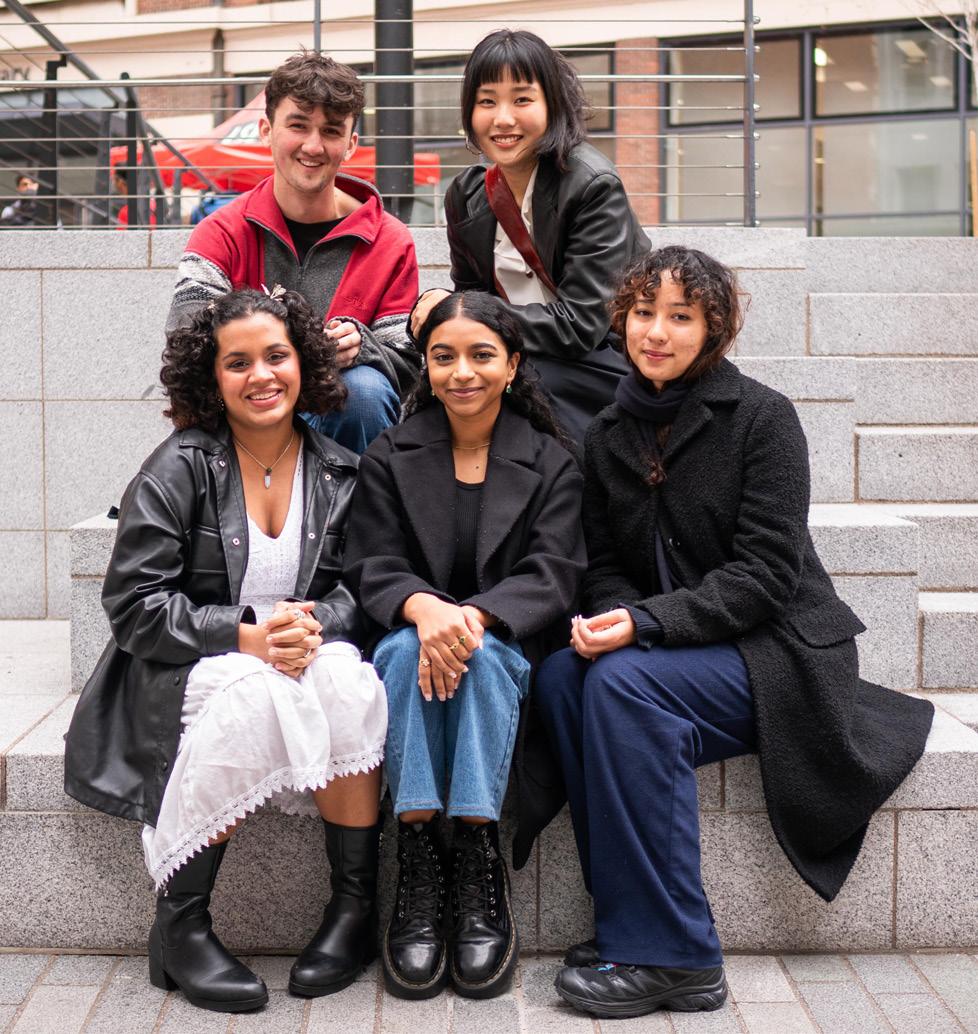
Hands O is a little older than 3 years old. It started around 2019 a er Carol, an AU event, and was meant to be a one-time initiative around Sexual Violence Awareness Week. Namitha explained, “It was Ella Holmes and Laura Goddard who decided that LSE students needed a more substantial organisation to combat sexual violence on campus, a safe space for students to lobby and to actually enact change. ey recruited rst years. And here we are, trying to carry on.”
Namitha noted that a lot has been achieved since the campaign’s founding. e unwavering commitment of the students working at Hands O has undoubtedly helped propagate change. Namitha revealed, “Everyone stays on basically throughout university.” Sewon added: “Now, even though I graduated, I still continue to work on the motion that I submitted with Vandana.”
Vandana, Sewon, and Namitha all joined Hands O a er going through bad personal experiences at the beginning of their time at the university. Namitha, who joined Hands O at the beginning of her rst year said, “I had absolutely no idea what to do about it. Because again, there was no signposting, no consent education, and it was kind of isolating. And I didn’t want anyone else to be in the same position as I was, just the blatant confusion of what the right thing to do was in that situation without a clear signposting to resources.”
In the very early days of Hands O , the members did not receive any training. Namitha explained, “We kind of trained ourselves. It was just like trying to think about what we would have wanted, if we were in the position of a lot of victims and survivors who reached out to us.” She added, “Since then, we’ve all had disclosure training and we’ve had a lot of meetings with Laura Boland, the newly appointed anti-harassment o cer.”
Although Namitha acknowledges that LSE’s hiring of an anti-harassment support advisor was a great improvement in policy, she feels that the role needs to be publicised more. “Victims and survivors still don’t really know who she is.”
Hands O has achieved much since it has started. Perhaps the most prominent one being the Consent Ed sessions that they have pushed for since the start of Hands O . Consent Ed is a training program devised to inform, empower, and educate all LSE students about consent. Namitha notes that for this programme, they’ve been working very closely with the SU “to get it pushed forward, to get it distributed.”
Vandana, Sewon, and Namitha mentioned several times how helpful the SU has been throughout the process. According to Namitha,“ ere are lots of people who do care, who work in the SU.” She added that they “put [Hands O ] on the top of their agenda, like I personally worked really closely with Robyn [Robyn McAlpine, the 2021 LSESU Education Sabbatical O cer], and she was amazing. She really, really cared about this issue, and would always consult us on Development Meetings and making sure the Consent Ed programme was running smoothly, getting us
involved and like collaborating. So, we’re grateful for that.” She feels like “the [SU] really do prioritise welfare. And what Hands O does is such a huge part of student well-being.” e current Community and Welfare Sabbatical O cer, Anaëlle oreau, has been involved with Hands O since her rst year, when she joined the campaign with Rahma Arifa and Eva Miccolis.
Hands O also worked closely with the AU last year. Before Carol, they had every sports club pledge to behave responsibly. Vandana observed,“ ey were very enthusiastic about it as well. I think almost every team showed up.” Namitha adds that collaborating with the AU is “something we’re really keen to continue doing this year.”
Hands O has done quite a lot of fundraising for charities. According to Vandana, the Hands O Sway night in collaboration with the AU alone raised £1660. e total £3000 fundraised over the last academic year went towards the charity Rape Crisis UK. Vandana noted that Hands O members “work closely with Rape Crisis UK. We fundraise for outside charities as well, focused on providing support for victims and survivors. But obviously we’d like to also expand on other possible charities as well.”
In March 2022, Hands O supported “Charlotte”, whose name was changed to preserve anonymity, in publishing her story in e Beaver, and protested alongside her on campus. Vandana observed that a er the AU night, the Charlotte article, and the protests, “People started nding out about what we were: our social media engagement increased a lot since May a er the protests.” Sewon believes that the increase in student interest is one of the most tangible changes that resulted from the protest. She described her freshers days, four years ago, when “there was no mention of Hands O or any sexual violence related talks or anything like that. No Consent Ed, no nothing.” Sewon believes people are now more interested in learning about Consent Ed and being active bystanders.
One of Hands O ’s main goals is assisting the passing of motions - which are student-led policy proposals - with the SU. Motions can be converted to o cial LSESU policy for two years if they pass the student body vote. Sewon explained “As students, we kind of signpost like, oh, this is a direction that we want the SU to lobby in. And then, once the motion is passed, they consider it as the guideline for lobbying the school.”
In March 2022, Hands O passed a motion with the SU, with the intent to help survivors feel adequately supported by the university; it received 574 YES votes. e motion now makes it an LSESU priority to push LSE to combat sexual violence and improve support on campus. Vandana explained, “ e motion was to make up for the inadequacies of LSE’s current sexual violence provisions.” Hands O ’s demands include: making a permanent anti-sexual violence team, publishing annual reviews and increasing transparency, creating a sexual violence IT platform, and signing the #cantbuymysilence pledge. e #cantbuymysilence pledge aims to end the use of Non-Disclosure Agreements for complaints about sexual harassment and assault. e pledge started getting more recog-
nition around January 2022 and since, a lot of UK universities such as UCL and Cambridge have signed it. As of the date of issue, according to the website #cantbuymysilence, several universities including LSE, KCL and Imperial College have not signed the #cantbuymysilence pledge.
As we reached the end of our interview, I asked them what was next for Hands O . Immediately, Namitha exclaimed, “We’ve got so much more to do!” She continued, “I’m really proud of the Consent Ed programme, but it does need to be balanced, we need to make it more inclusive. We want it to be more re ective of the student body here at LSE.”
Namitha added that another key priority of Hands O was to make the LSE complaints process a lot smoother for victims and survivors. She said, “If someone’s had a negative experience of sexual violence, there is a reporting process at LSE, where you can formalise your complaint, especially if the perpetrators are fellow students. But, as you’ve already read in the Charlotte article, it is a very traumatic process that has done a huge injustice to victims and survivors. So, we want to help streamline that and make it better.” One member explained, “making LSE care about what we care about and prioritising it has been di cult at times, they have an agenda and scarce budgetary resources too, that don’t necessarily prioritise our [agenda].”
e three of them are really proud of the work they are able to do at Hands O e members noted that a big part of what Hands O has tried to do is “be the middleman”. ey explained, “ ere were actually a lot of resources available that [LSE] has put money in, but they haven’t made those resources [easily accessible] to students, like the website can be really hard to navigate.”
In the pictures, you see Loïc Stuart-Delavanine, Anaëlle oreau and Nicole Streun joining Sewon, Namitha and Vandana. Hands O is a growing organisation, with passionate students working persistently to help make the LSE campus safe for everyone. You could be one of them. Hands O is always recruiting and if you are interested, contact Hands O on their Instagram or feel free to reach out directly to any of their members.
HANDS OFF A RELENTLESS FORCE FOR CHANGE
photography by JACK LOVE

interview by AMBRE PLUTA
ISSUE 921 MT WEEK 3 2022
REVIEW

SOCIAL PART B
SPORT
HANDS OFF
all time best sport editor wanted horror-scopes small beautiful things A
RELENTLESS FORCE FOR CHANGE



 Sta Writer
Illustrated by Charlie To
Sta Writer
Illustrated by Charlie To


























 Chenoa Colaco Staff Writer
Chenoa Colaco Staff Writer



 Vanessa Huang Staff Writer
Vanessa Huang Staff Writer






 by LIV KESSLER & illustrated by XI CHEN
by LIV KESSLER & illustrated by XI CHEN

 by MATT SUDLOW & illustrated by CHARLIE TO
by MATT SUDLOW & illustrated by CHARLIE TO

 by LIV KESSLER & illustrated by CHARLIE TO
by LIV KESSLER & illustrated by CHARLIE TO

 EDITED BY BEN HELME
EDITED BY BEN HELME









 Image from London eatre
Image from London eatre




 By Anouk Pardon
& illustrated by Sasha Varpahovsky
By Anouk Pardon
& illustrated by Sasha Varpahovsky
 By Hila Davies & illustrated by Sasha Varpahovsky
By Hila Davies & illustrated by Sasha Varpahovsky




